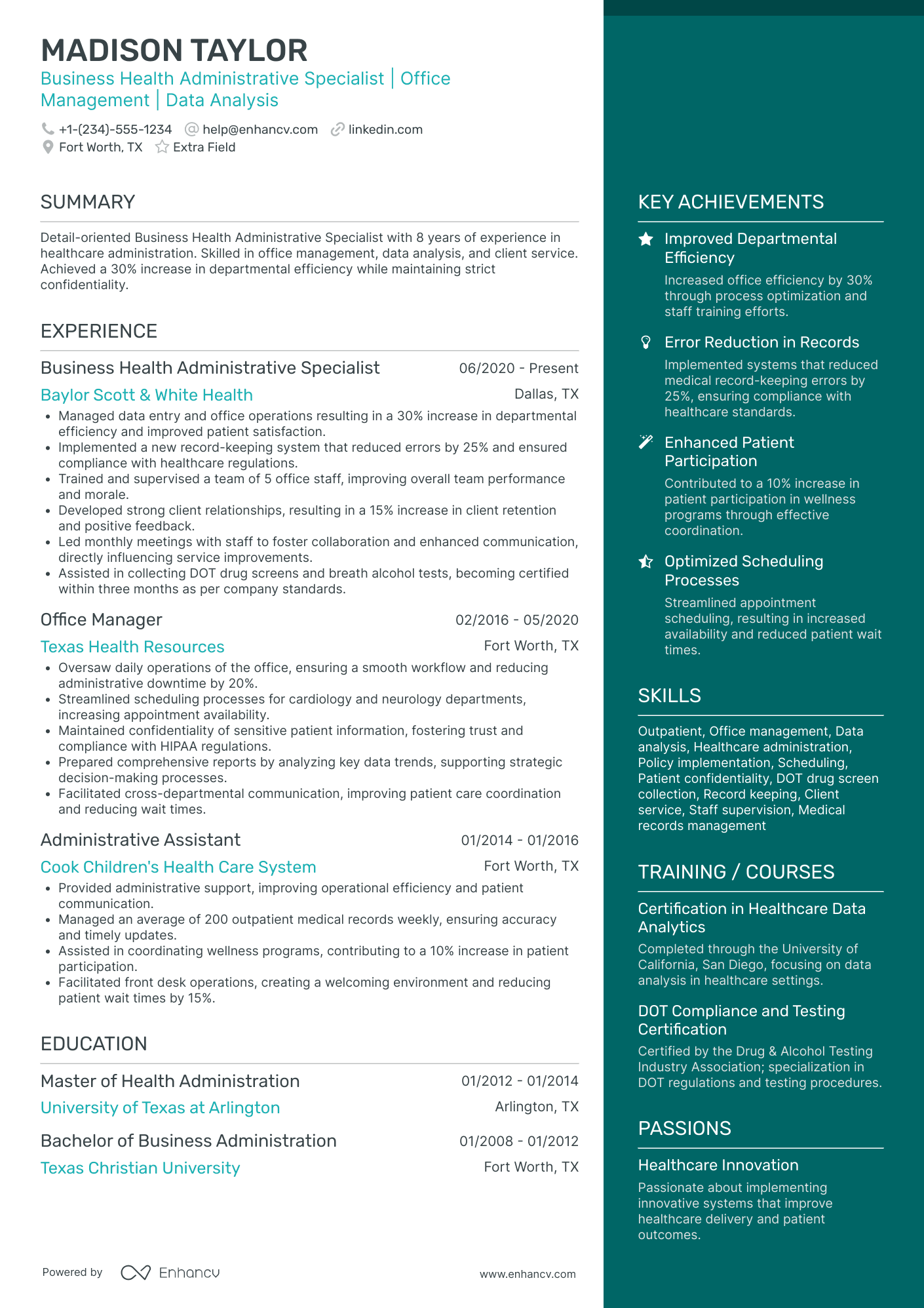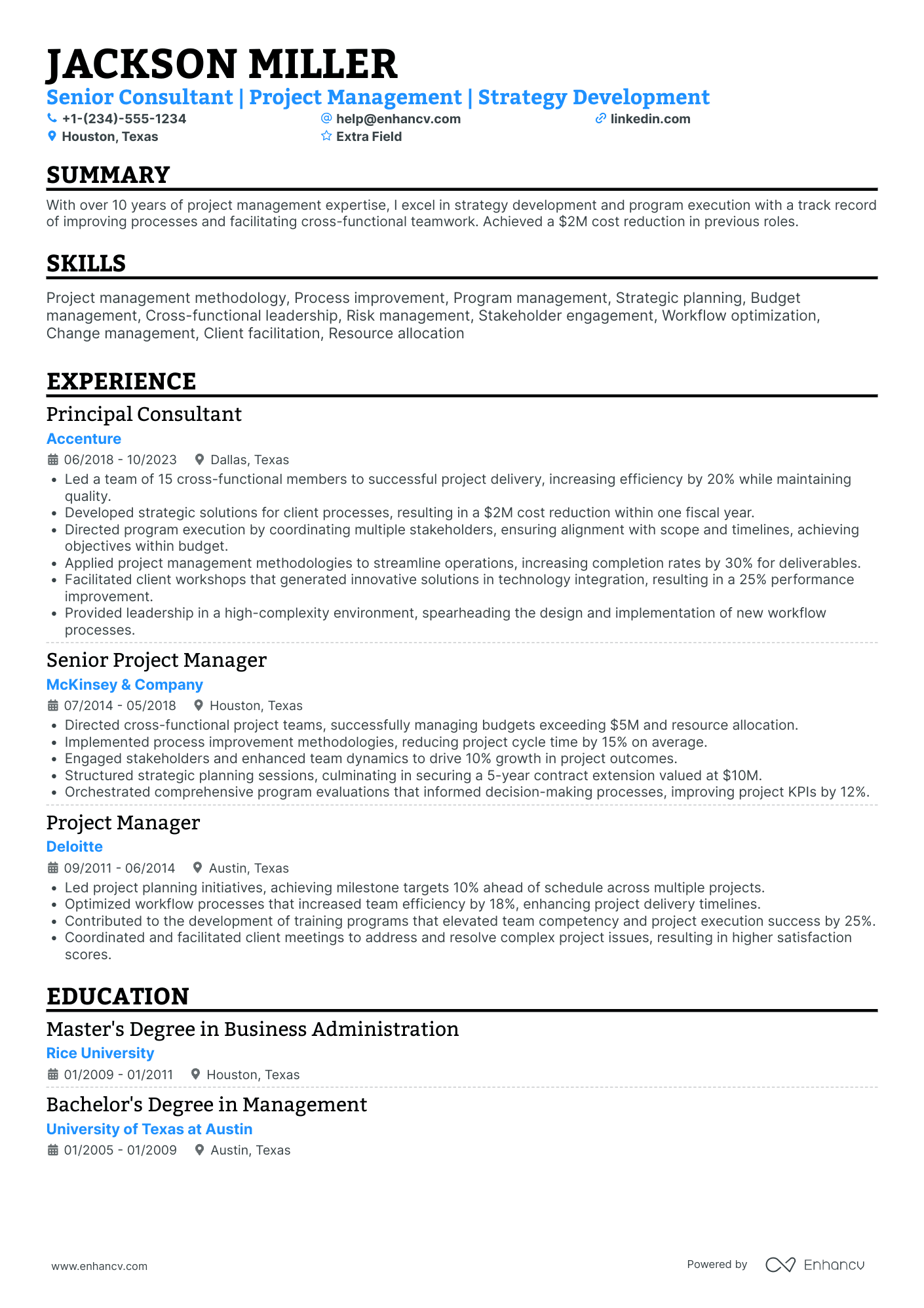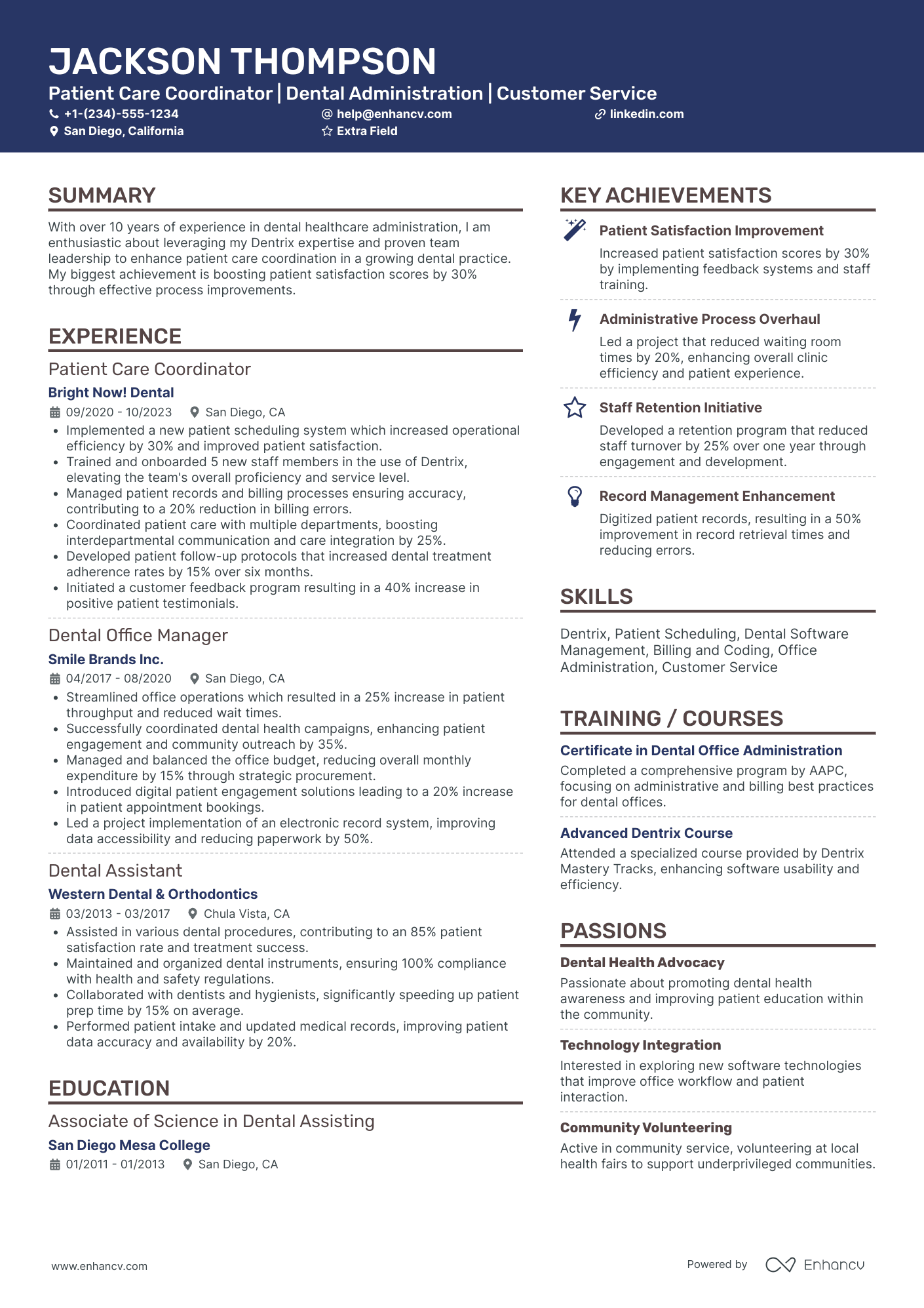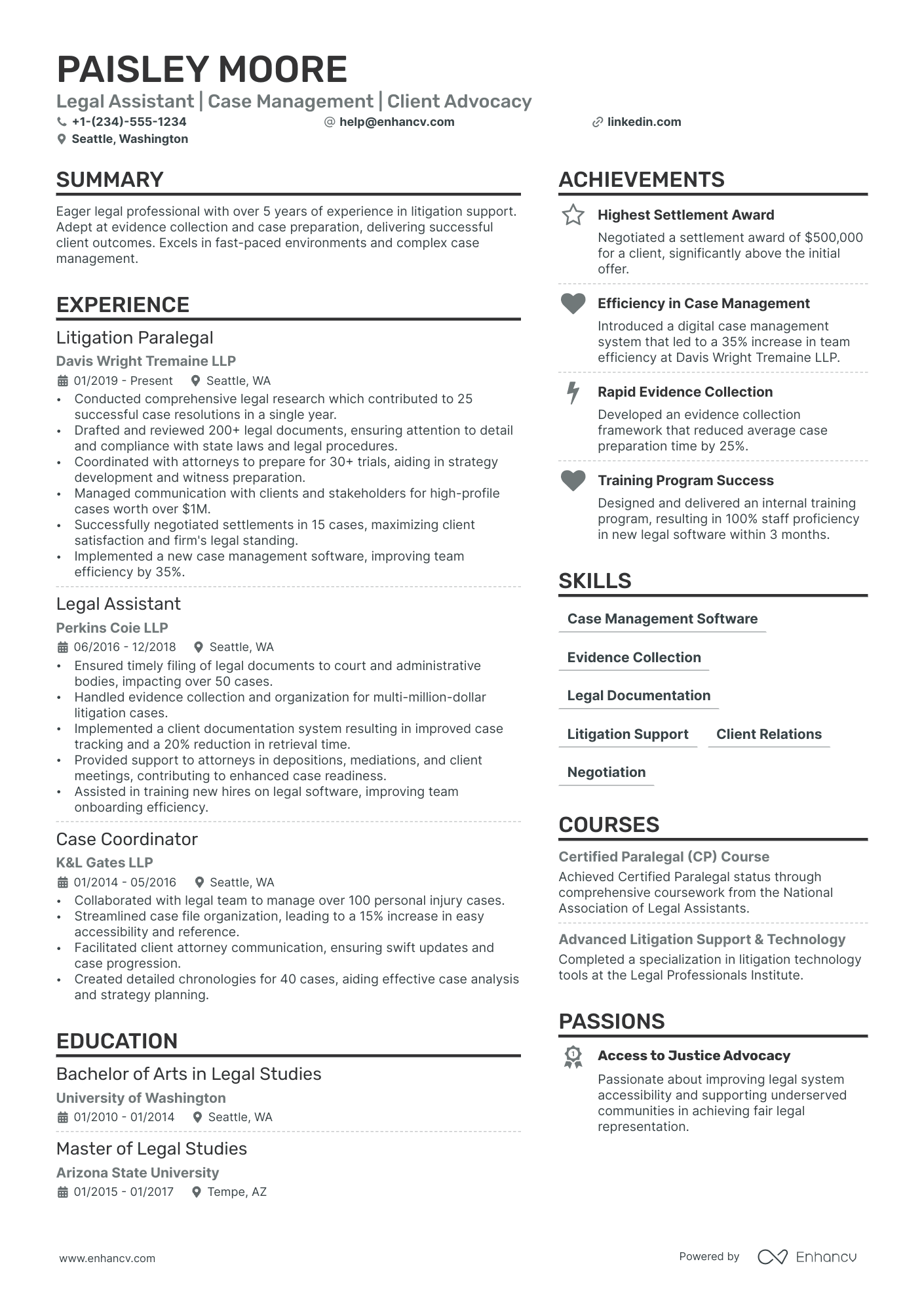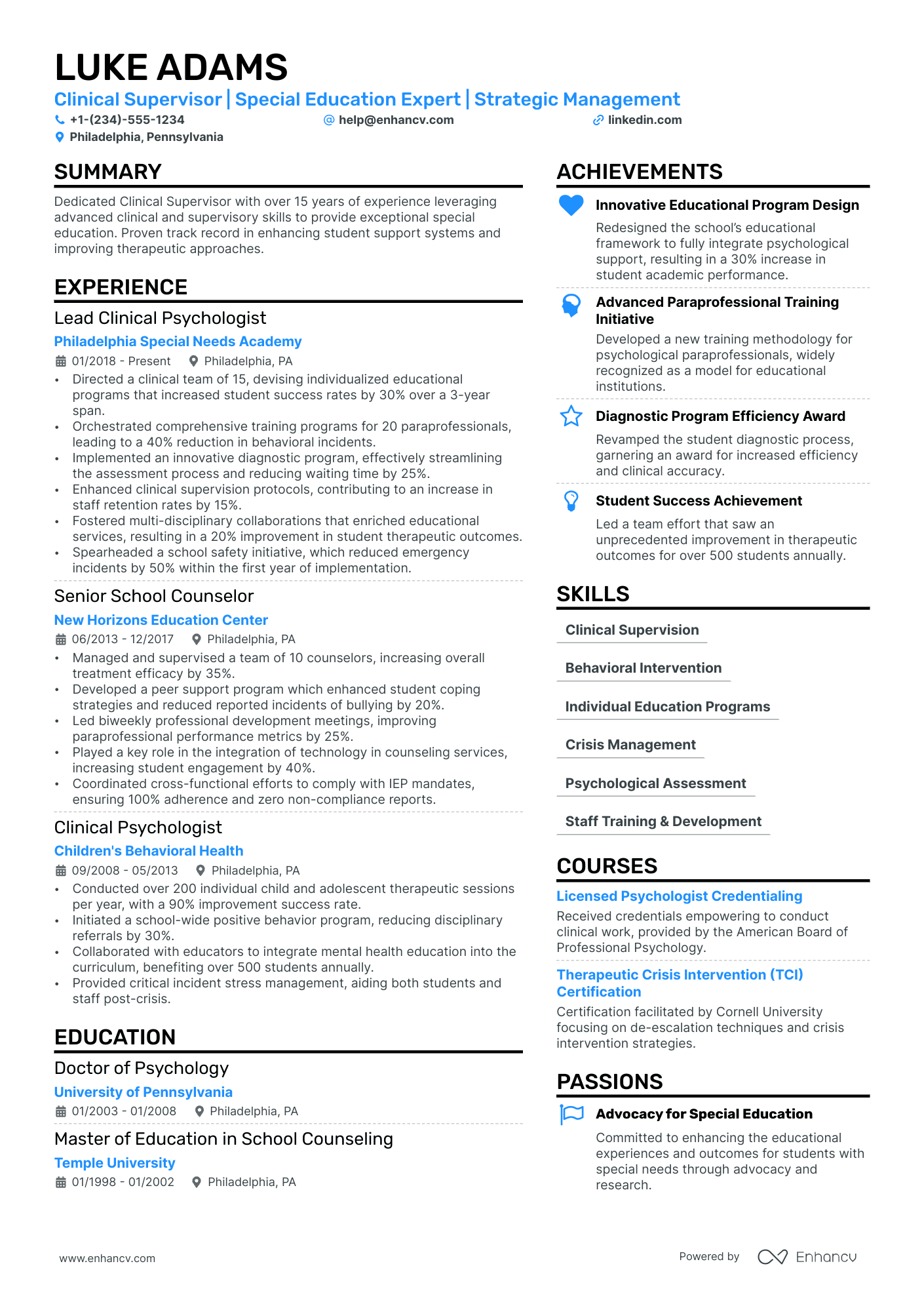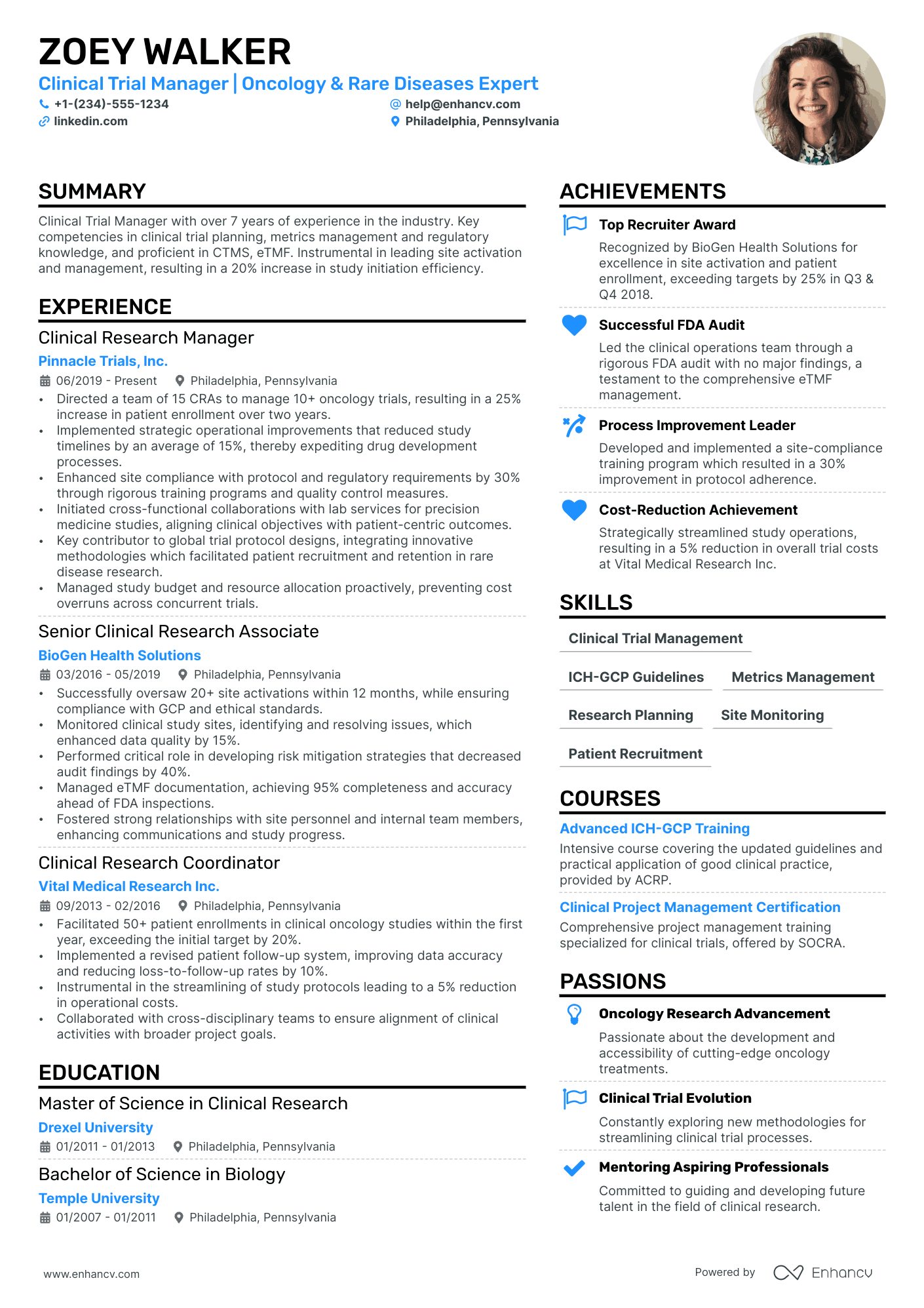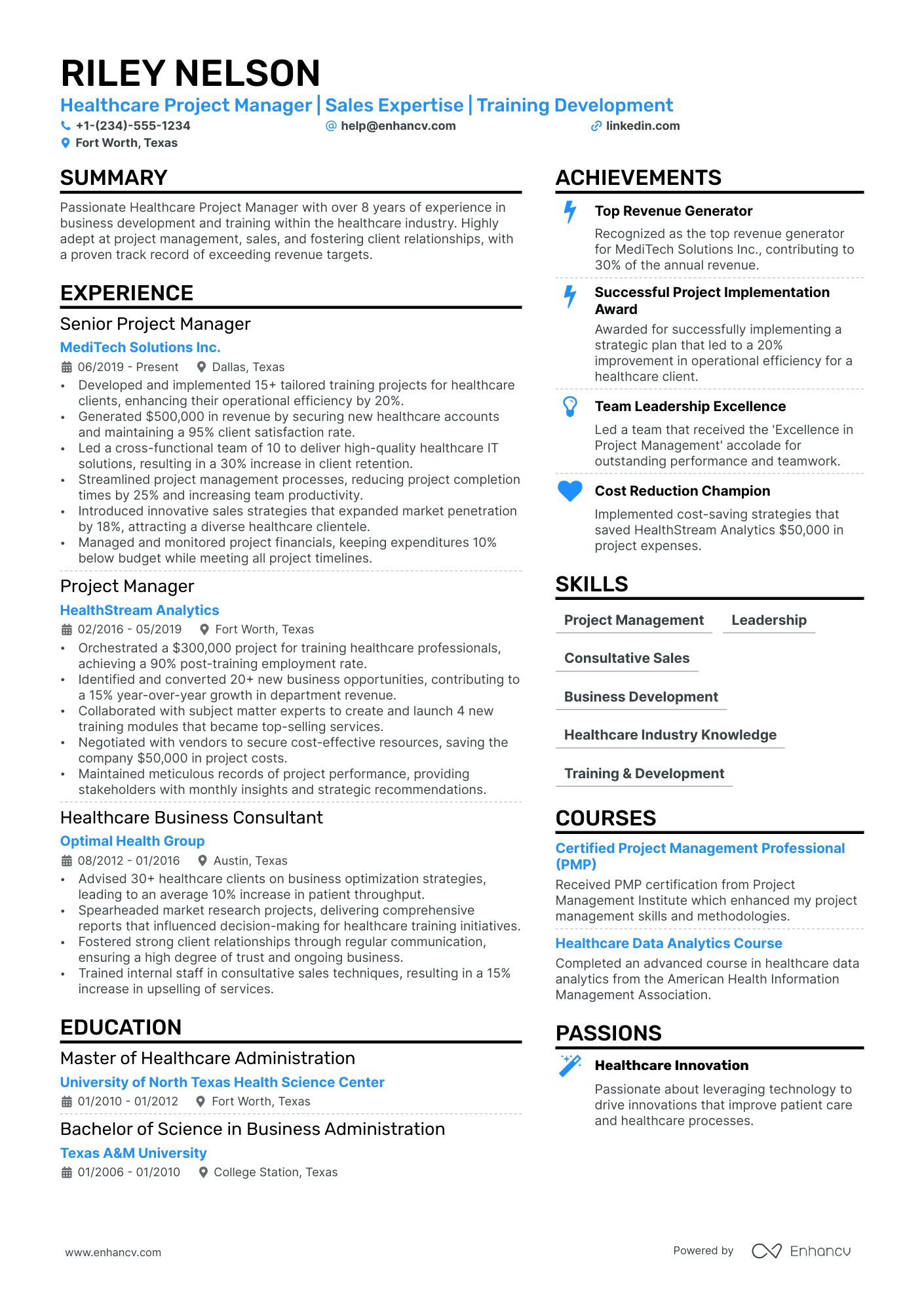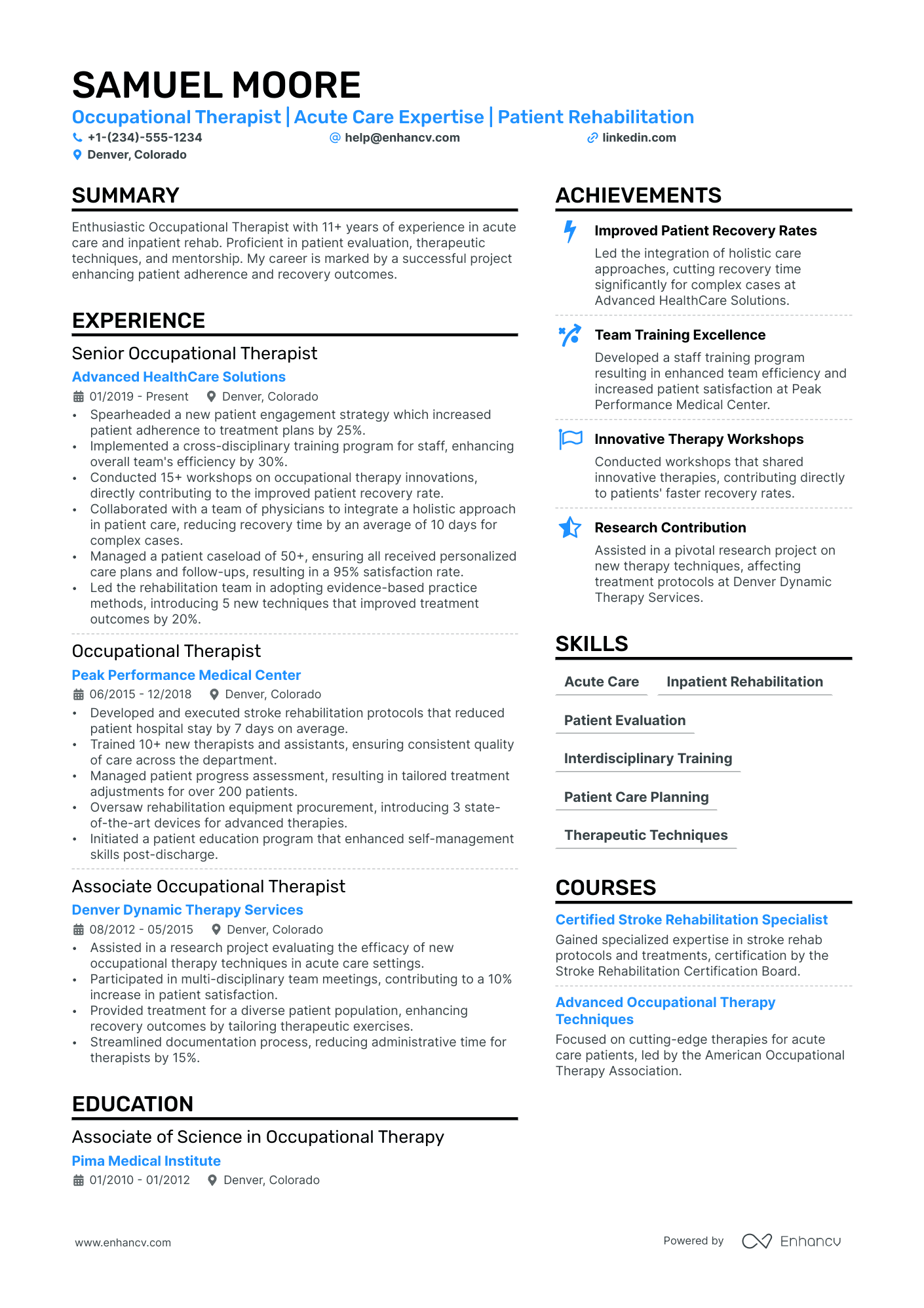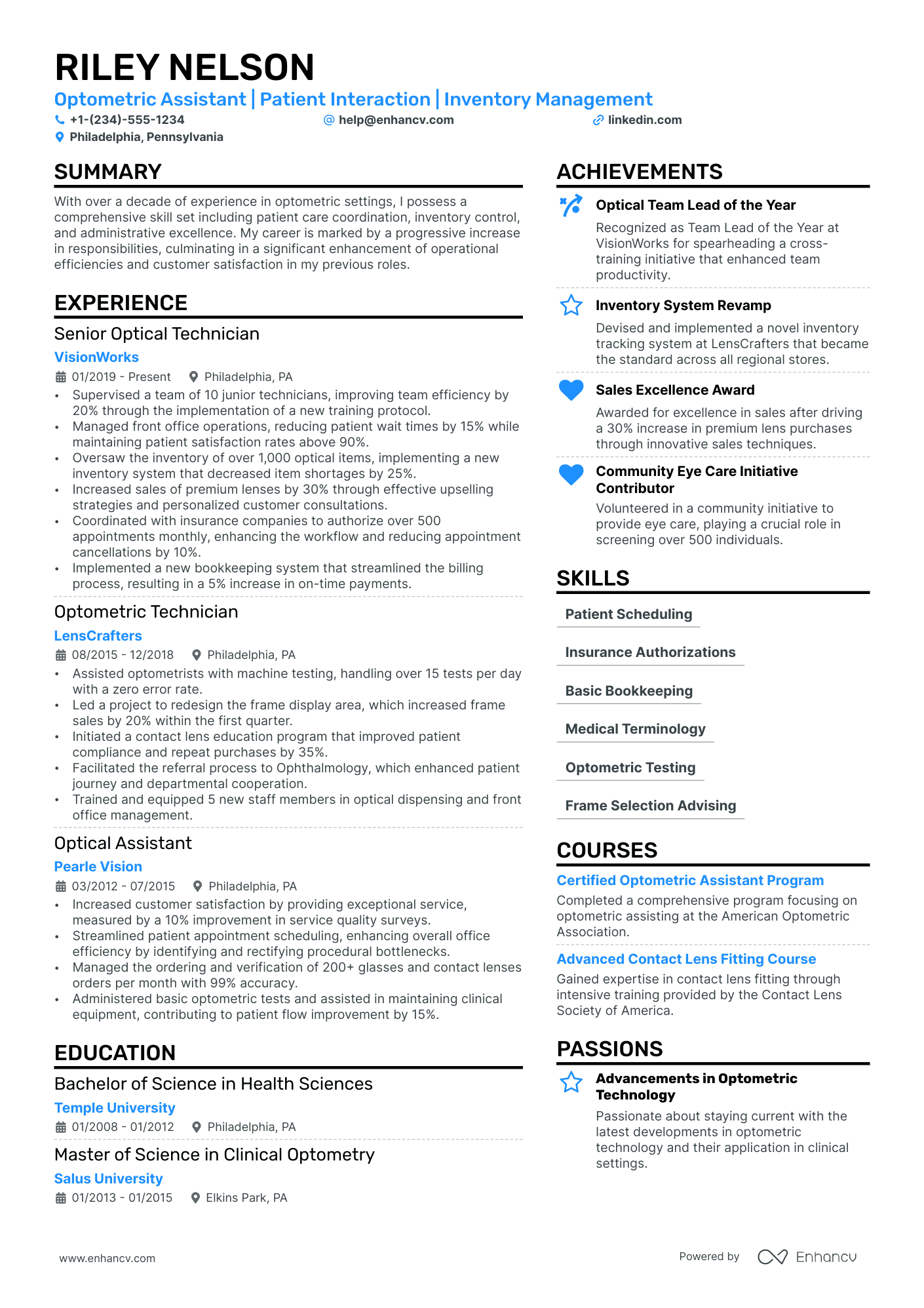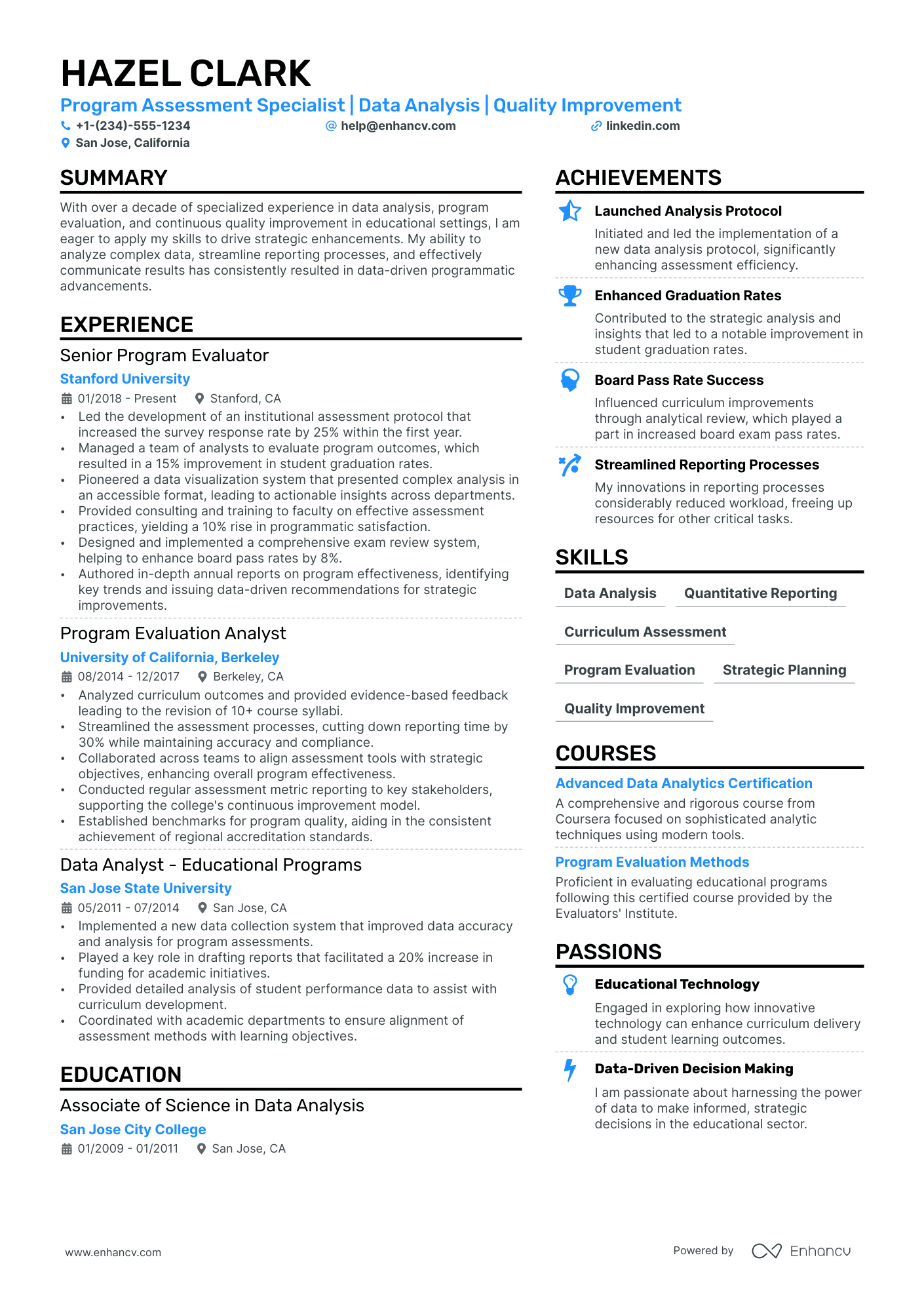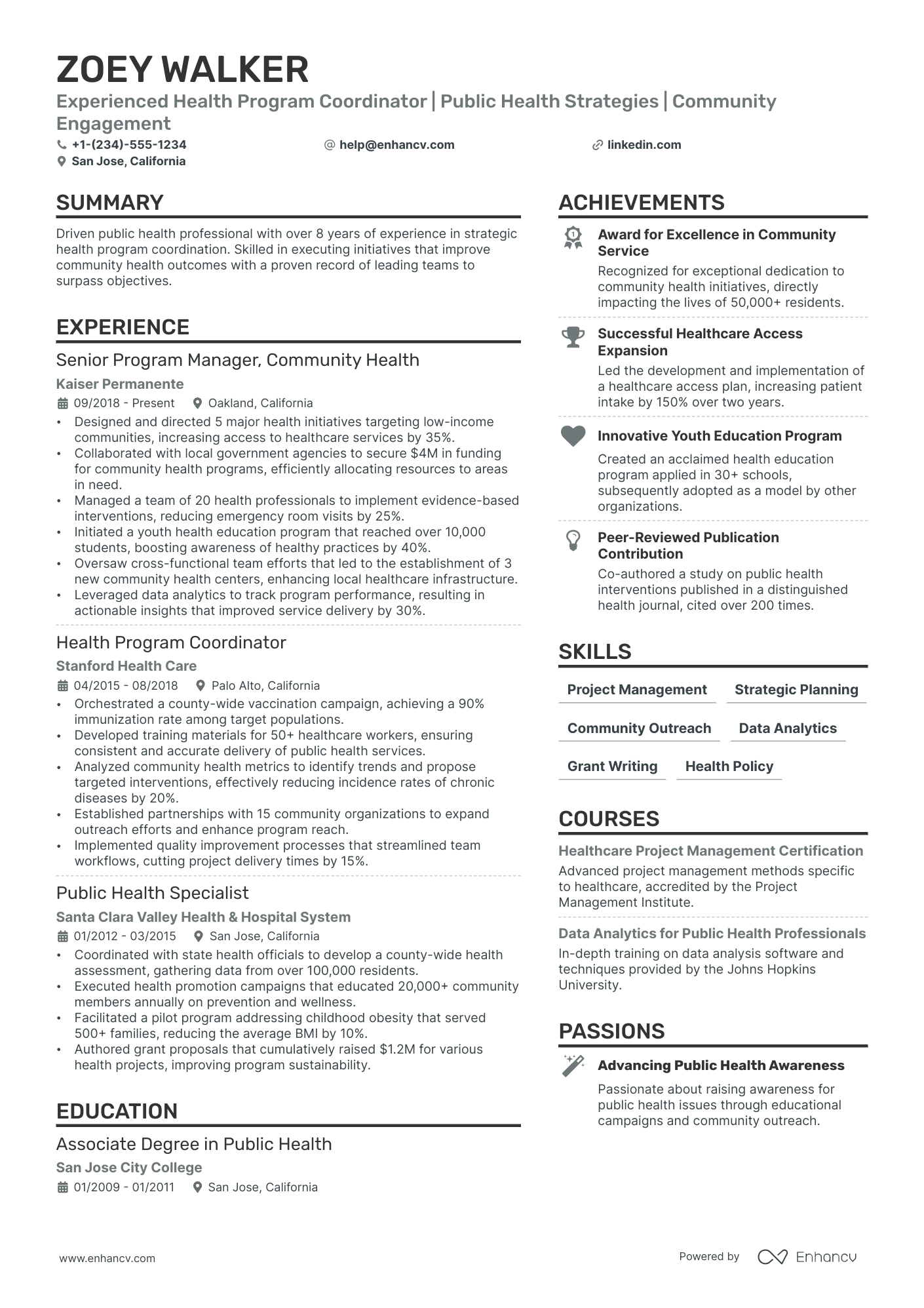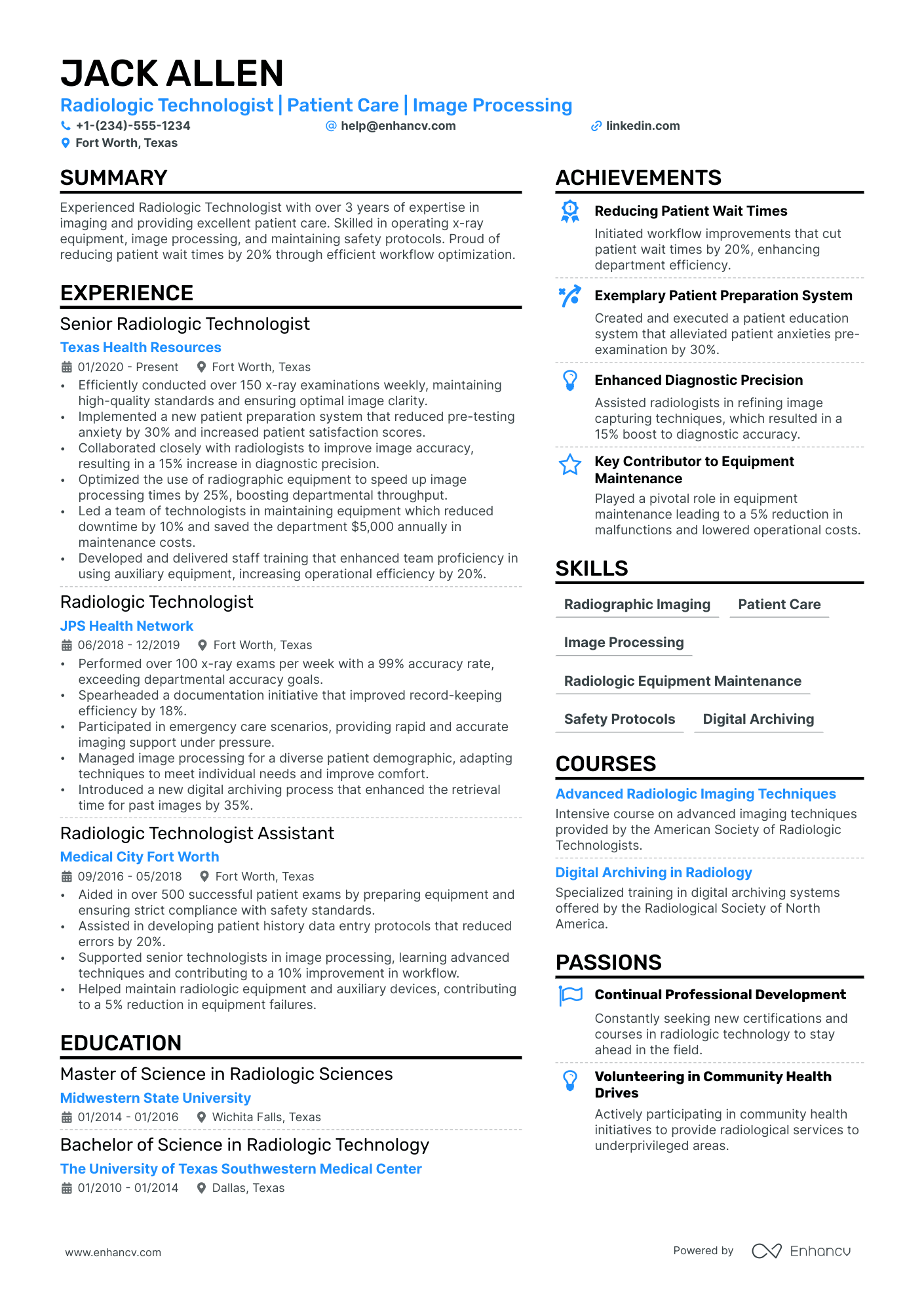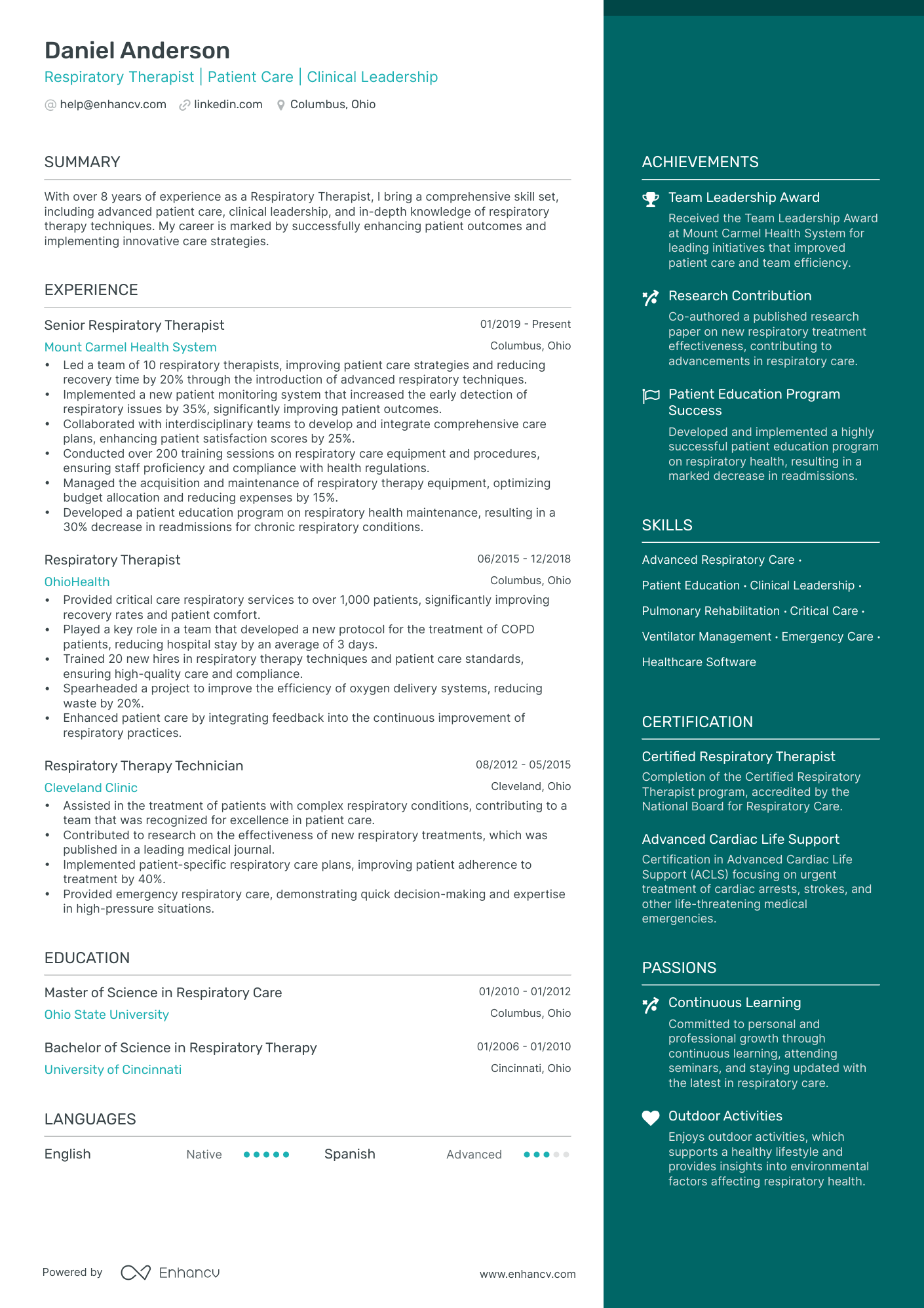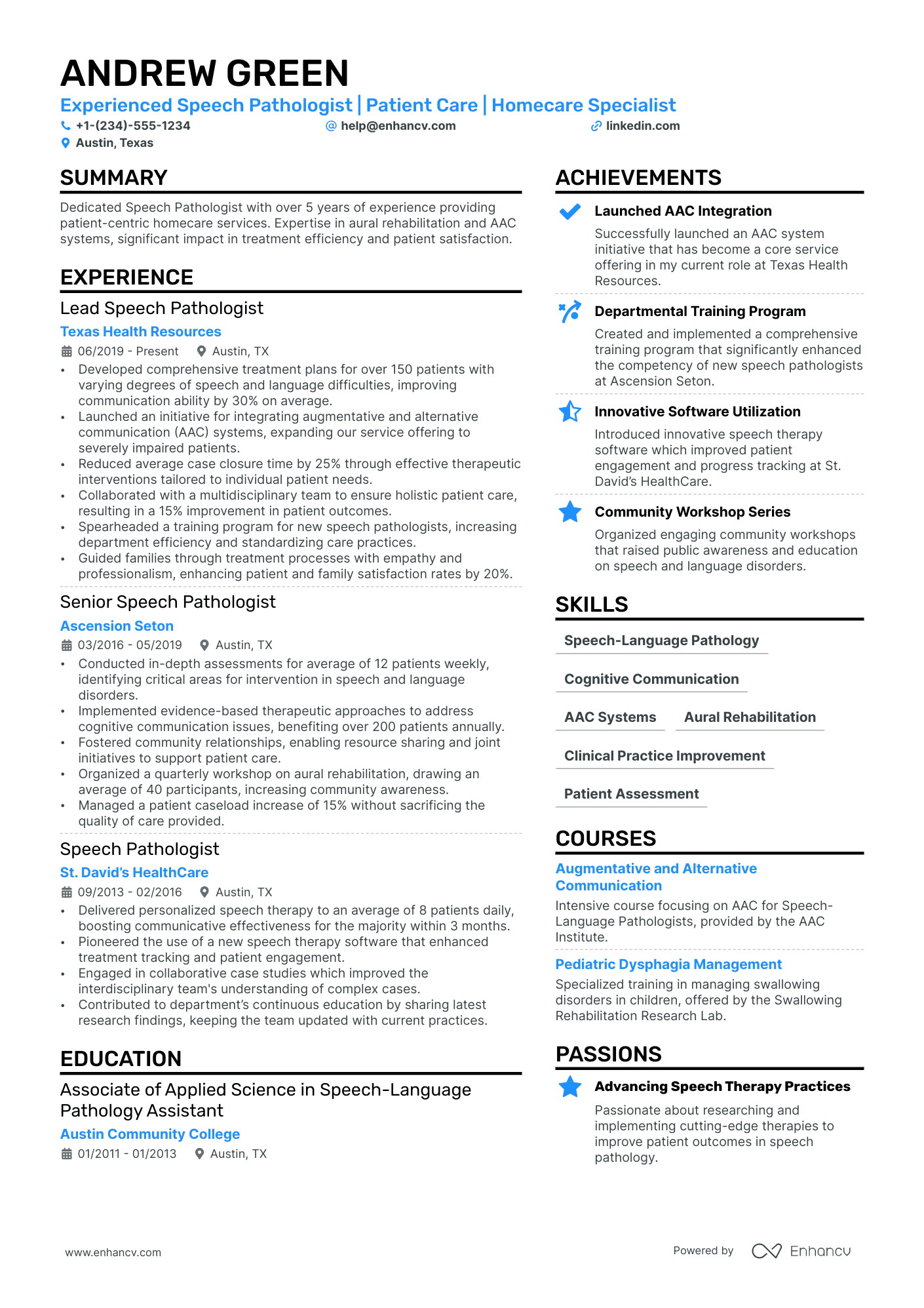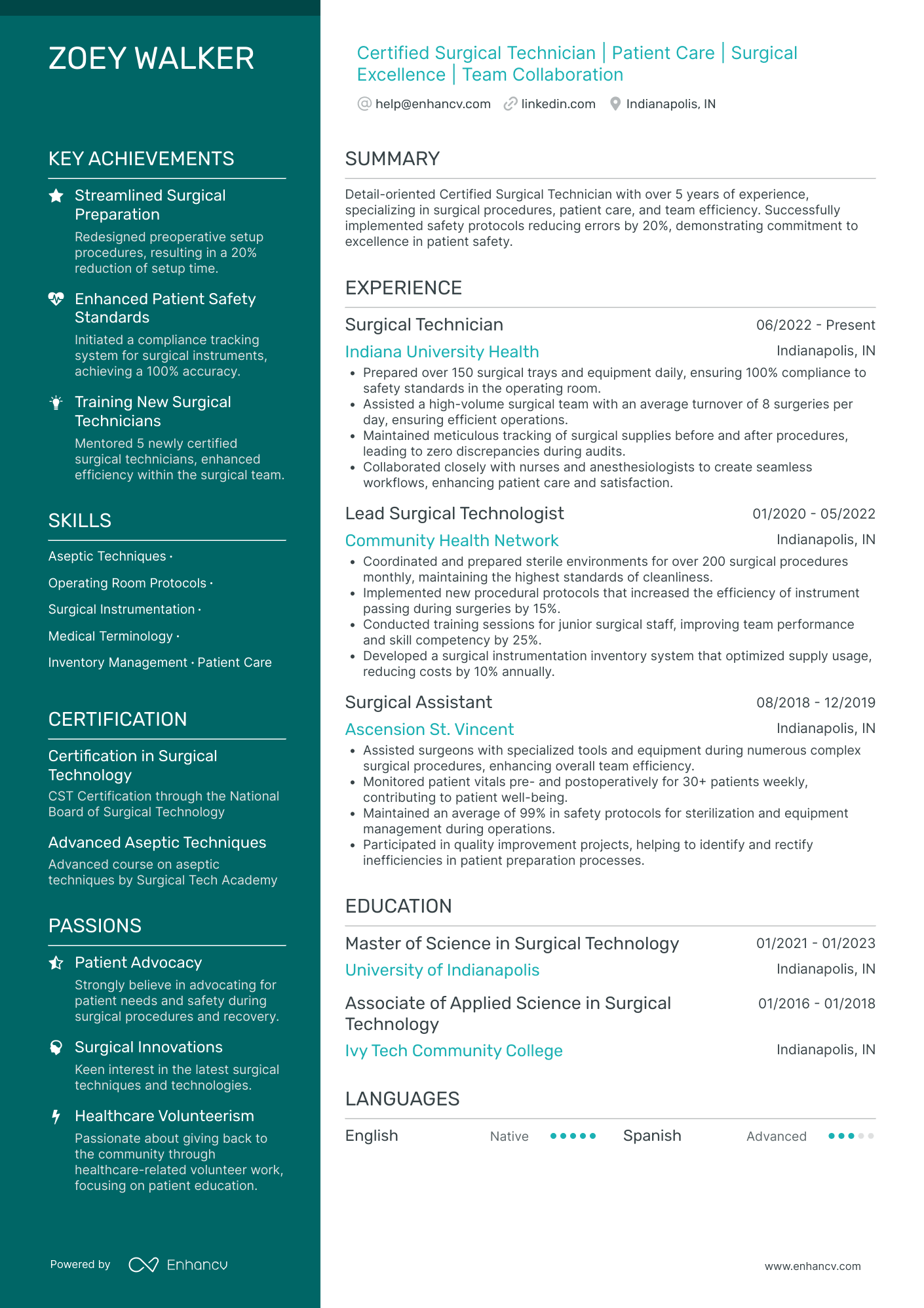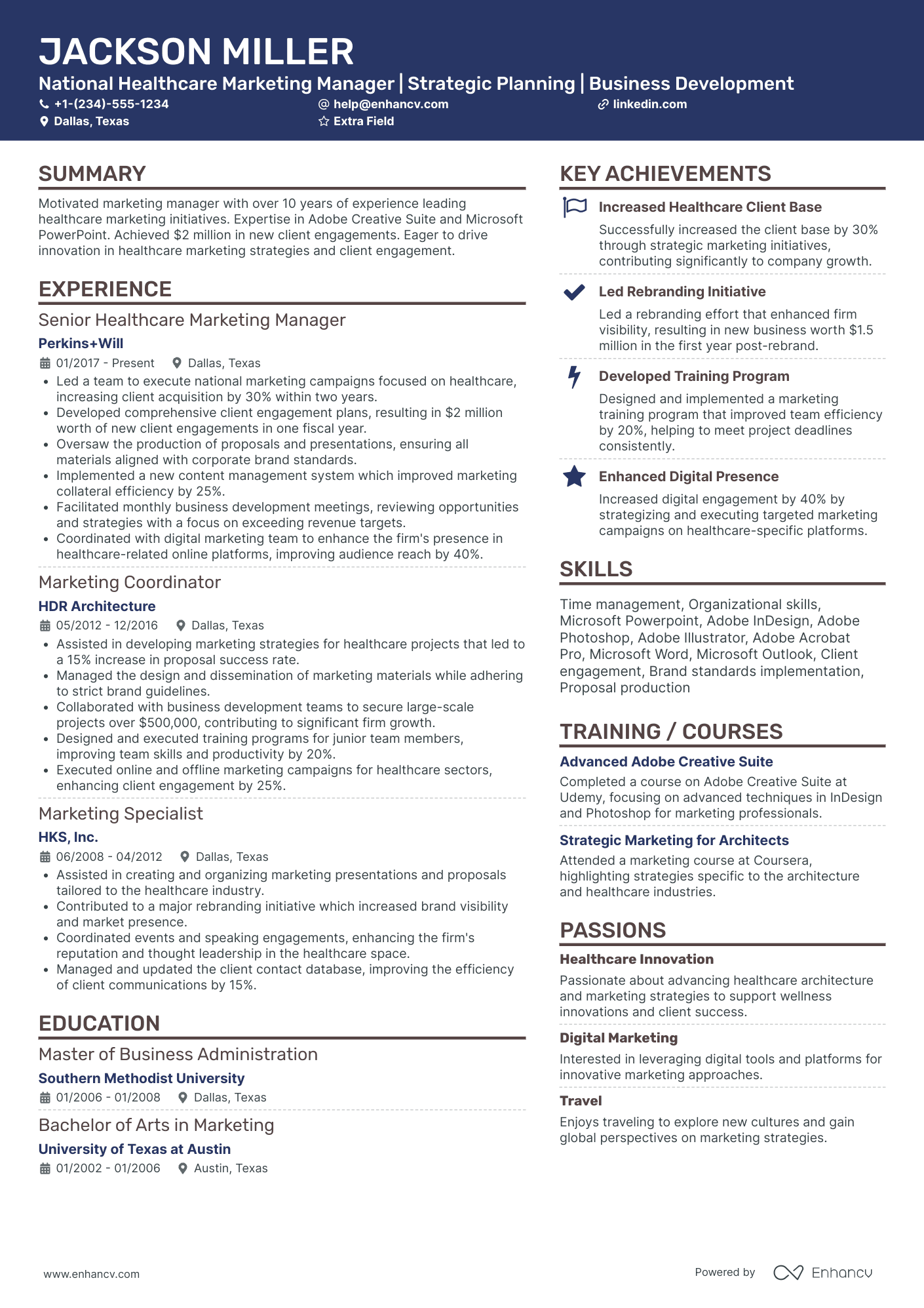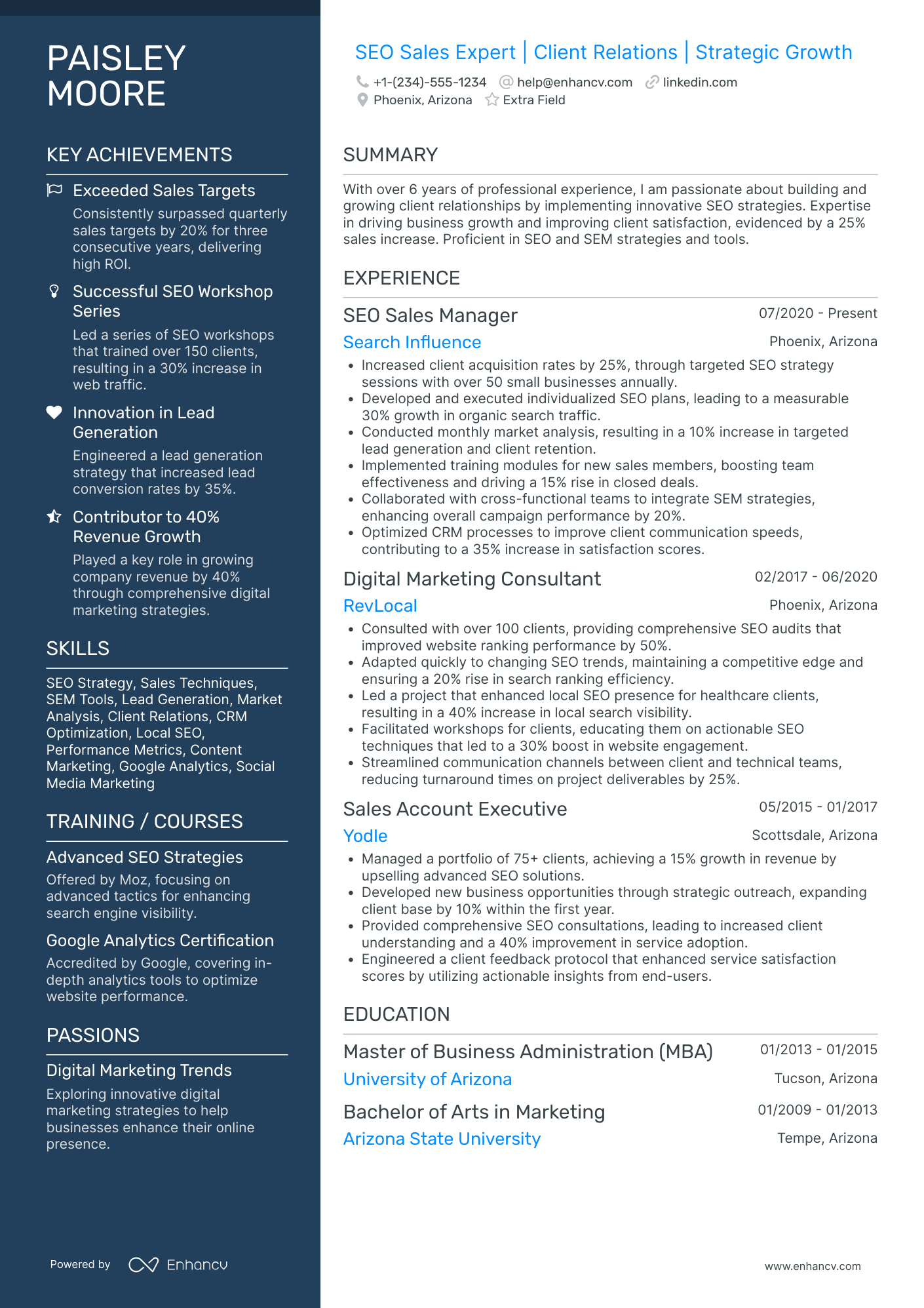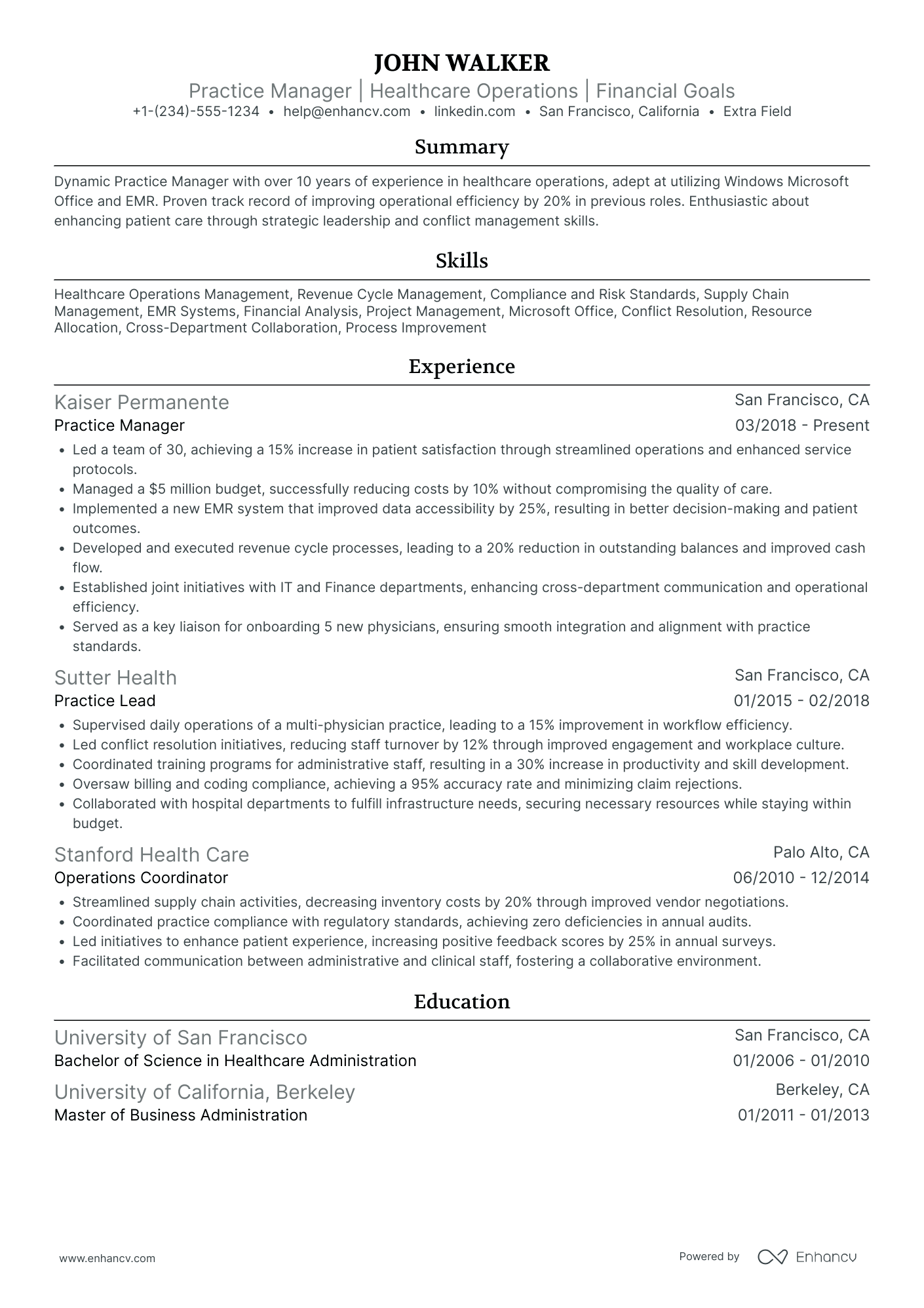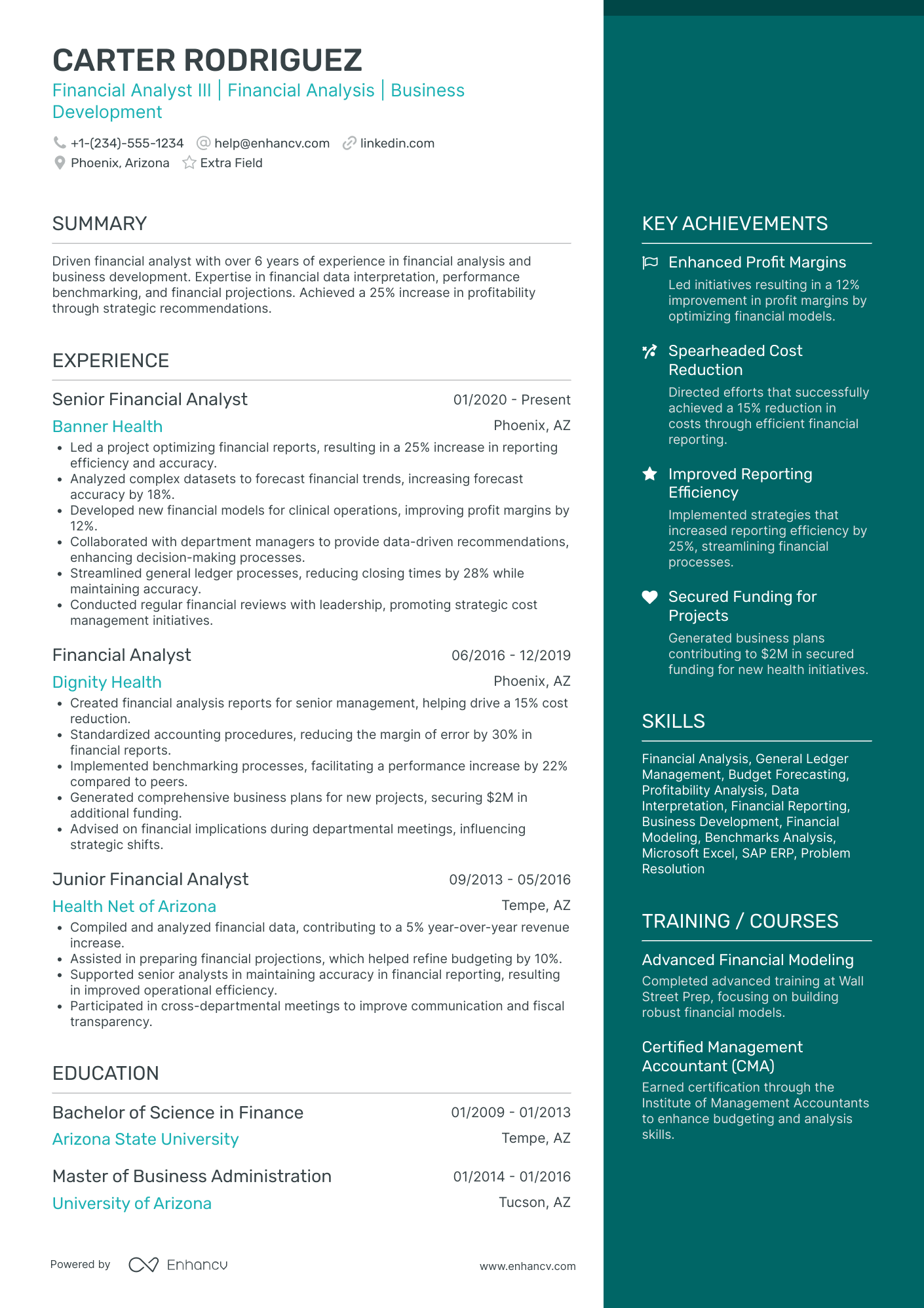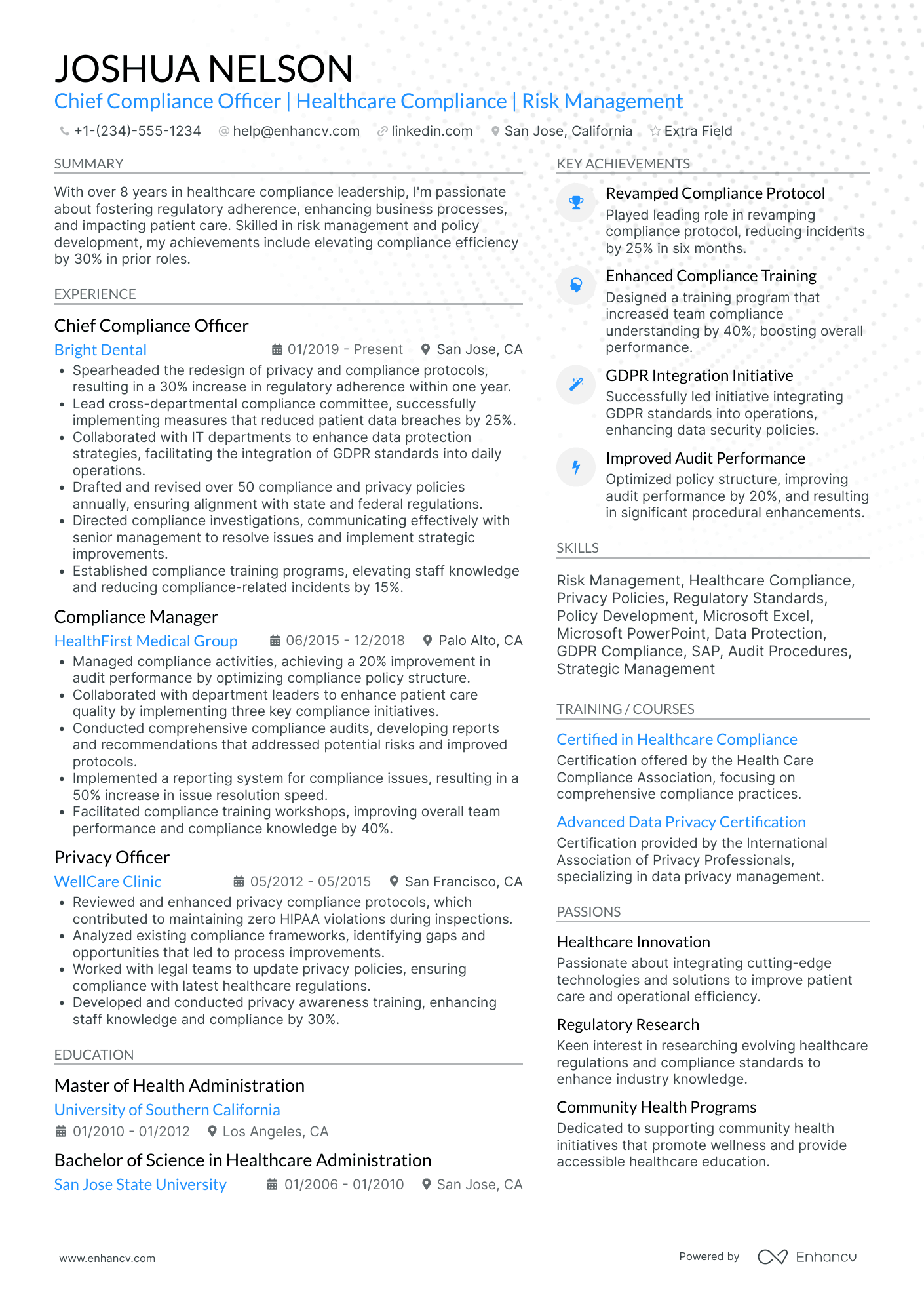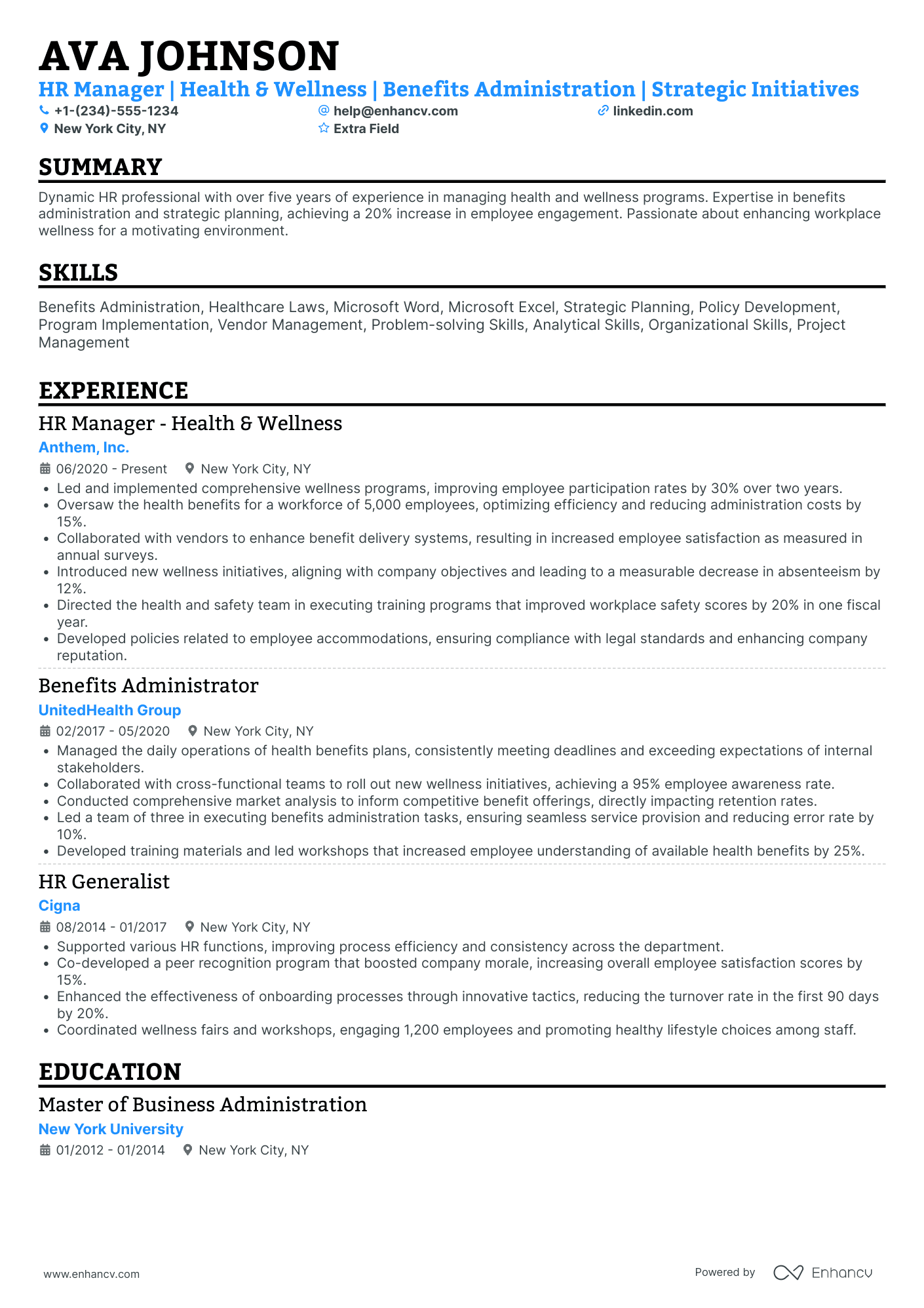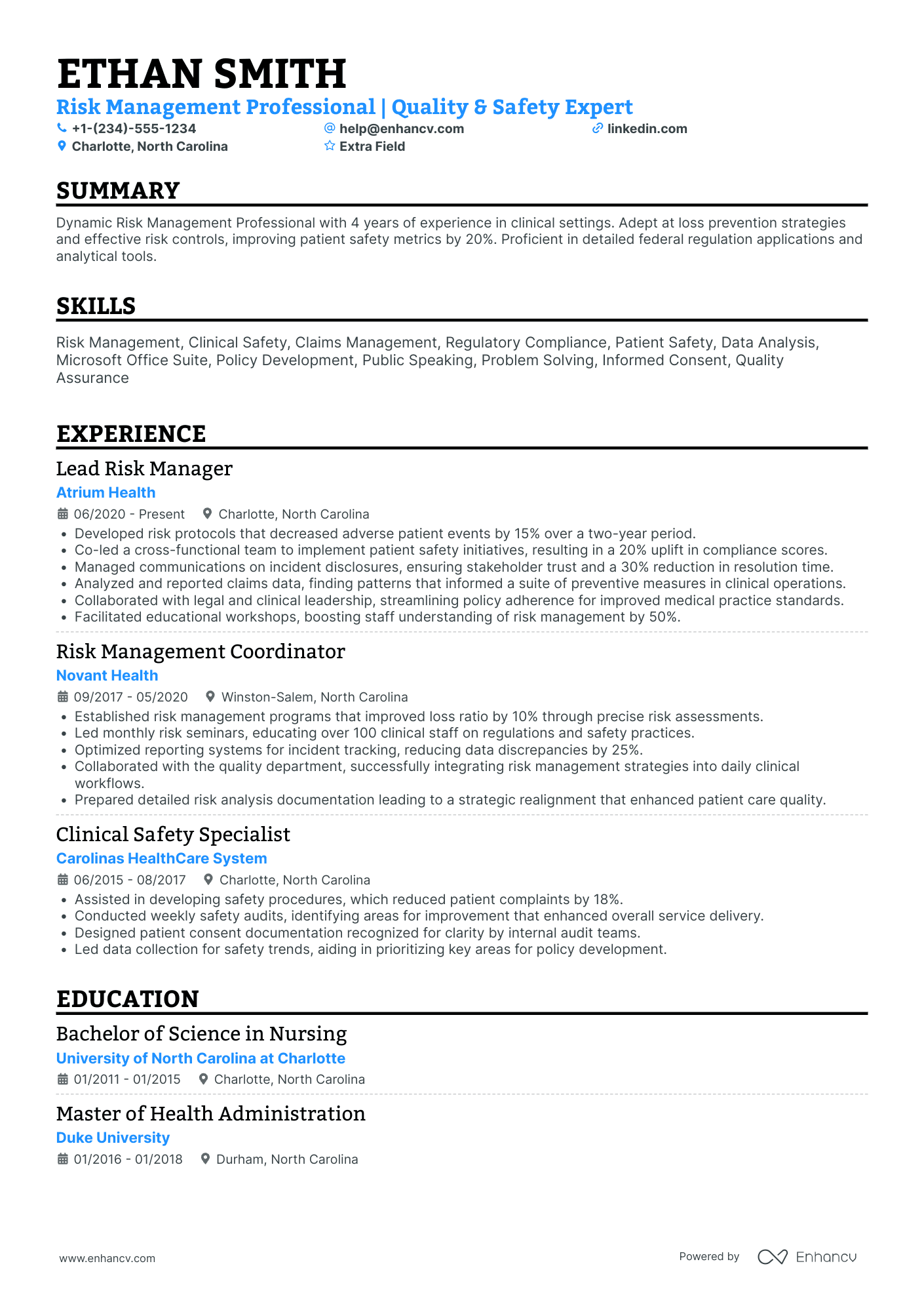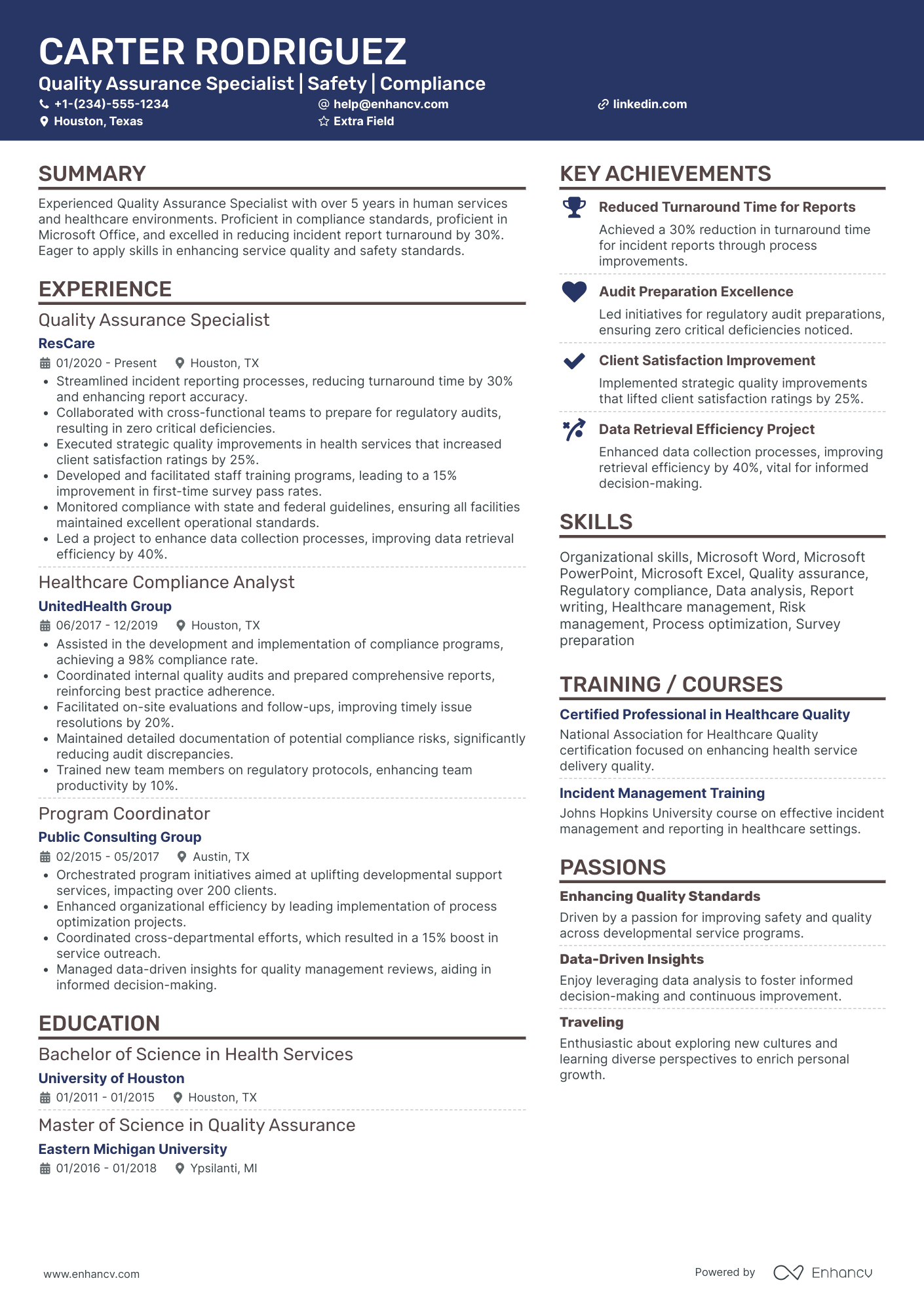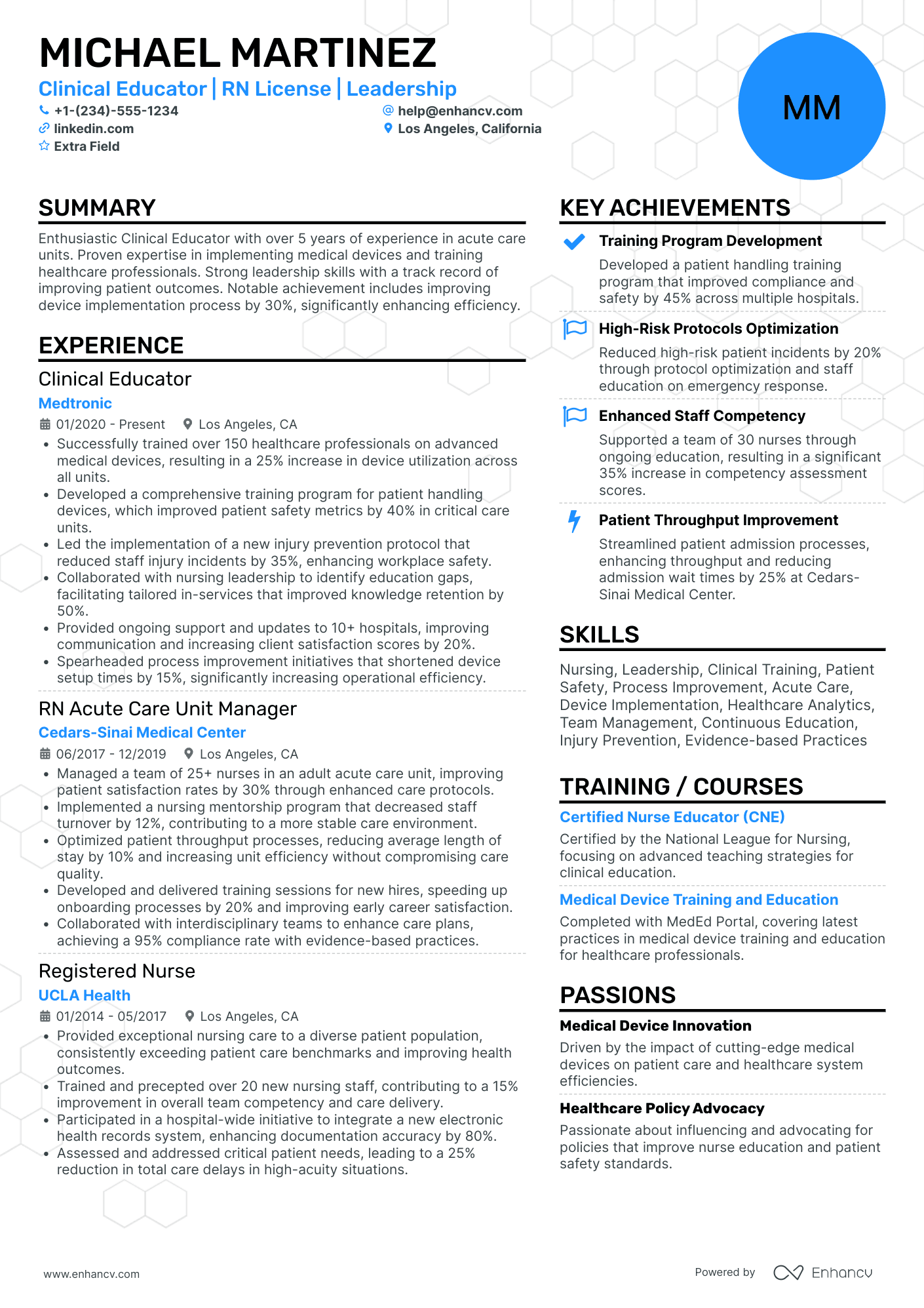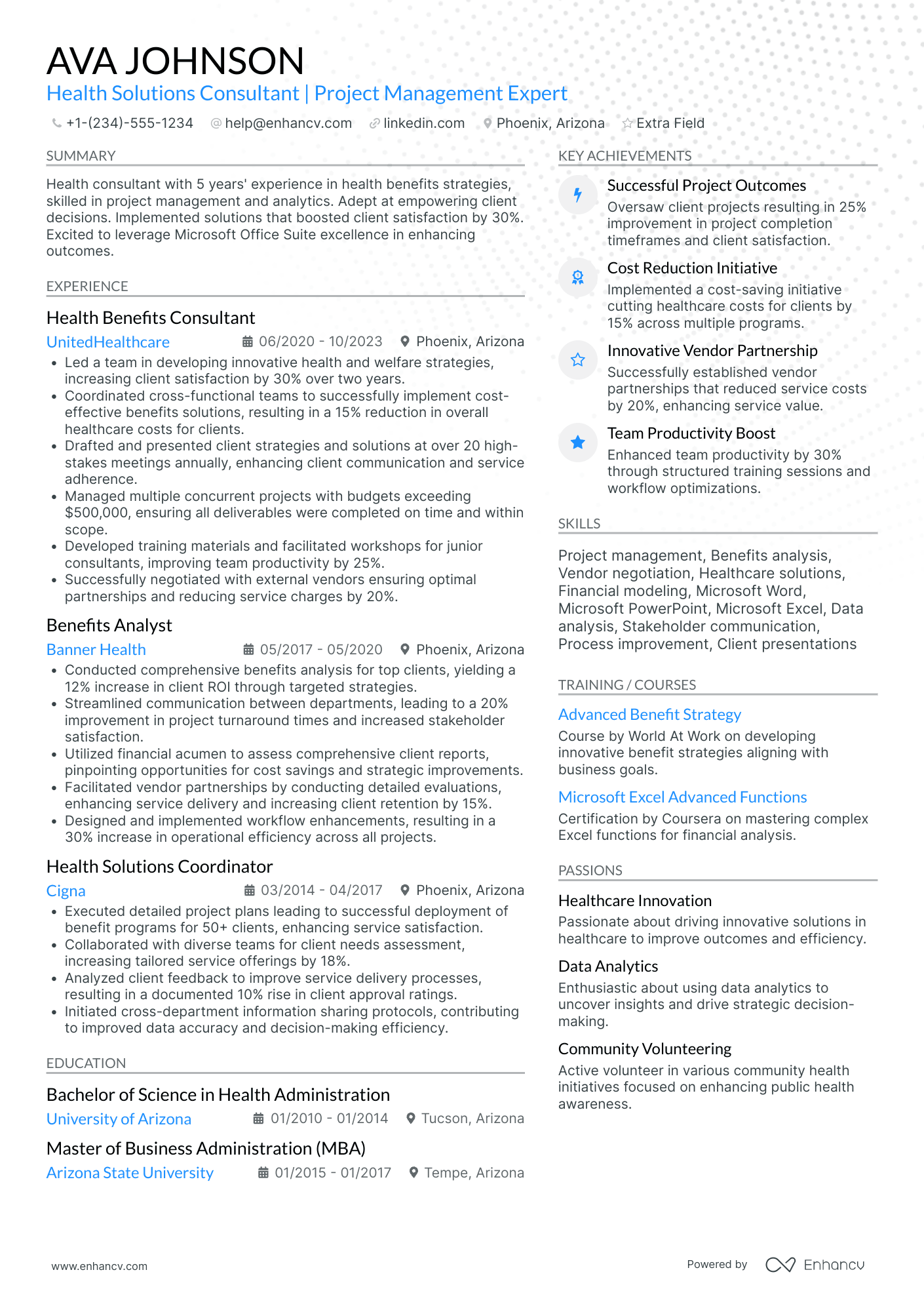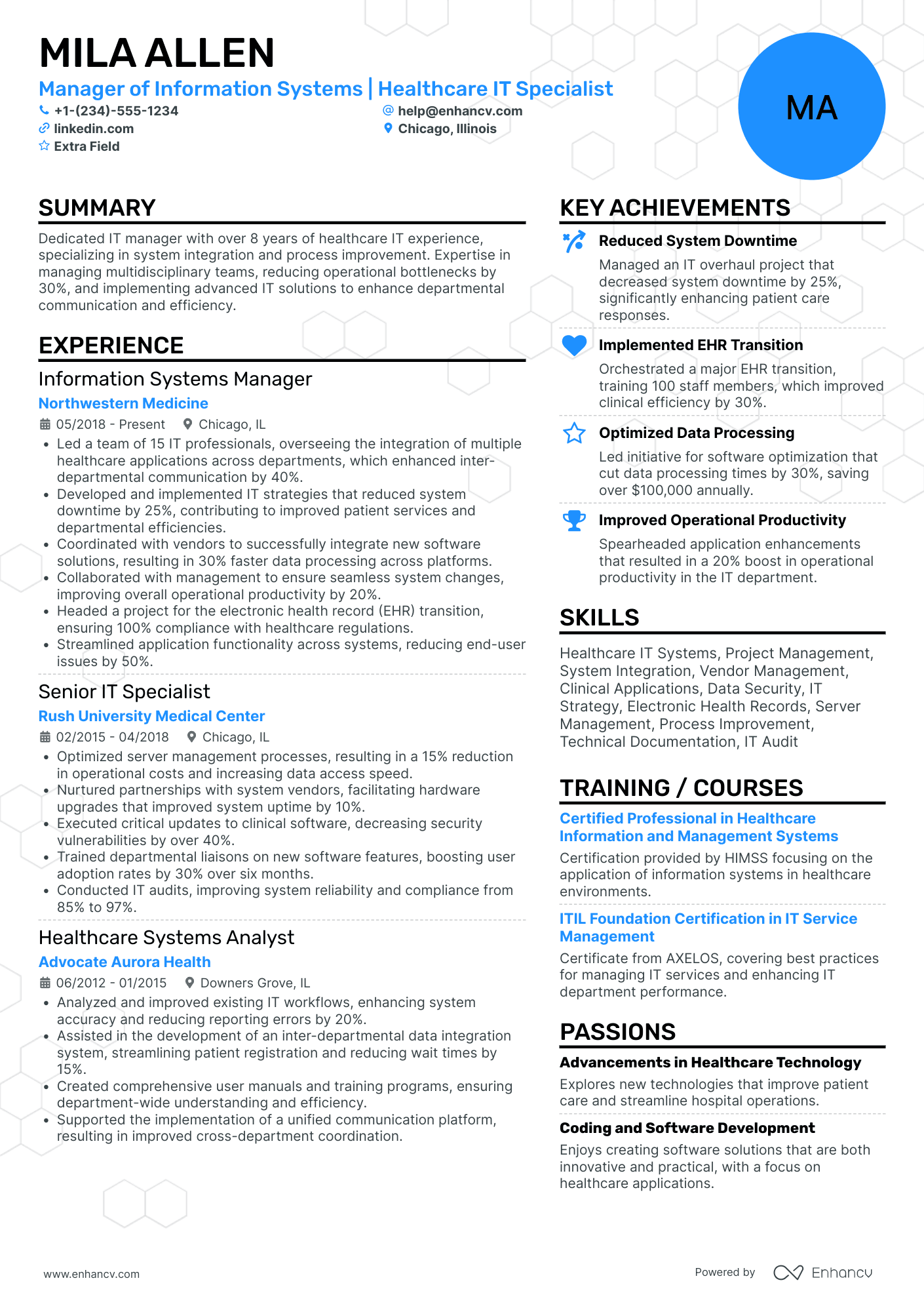One significant resume challenge you may face in the competitive field of healthcare is effectively conveying the breadth of your medical knowledge and patient care experience. Our comprehensive guide will provide you with the tools and examples you need to craft a standout resume that highlights your unique qualifications and sets you apart in the healthcare industry.
- Healthcare resume samples that got people hired at top companies.
- How to perfect the look-and-feel of your resume layout.
- How to showcase your achievements and skills through various resume sections.
- How you could hint to recruiters why your resume is the ideal profile for the job.
If the healthcare resume isn't the right one for you, take a look at other related guides we have:
Designing your healthcare resume format to catch recruiters' eyes
Your healthcare resume will be assessed on a couple of criteria, one of which is the actual presentation.
Is your resume legible and organized? Does it follow a smooth flow?
Or have you presented recruiters with a chaotic document that includes everything you've ever done in your career?
Unless specified otherwise, there are four best practices to help maintain your resume format consistency.
- The top one third of your healthcare resume should definitely include a header, so that recruiters can easily contact you and scan your professional portfolio (or LinkedIn profile).
- Within the experience section, list your most recent (and relevant) role first, followed up with the rest of your career history in a reverse-chronological resume format .
- Always submit your resume as a PDF file to sustain its layout. There are some rare exceptions where companies may ask you to forward your resume in Word or another format.
- If you are applying for a more senior role and have over a decade of applicable work experience (that will impress recruiters), then your healthcare resume can be two pages long. Otherwise, your resume shouldn't be longer than a single page.
Different markets have specific resume formats – a Canadian resume could vary in layout.
Upload & Check Your Resume
Drop your resume here or choose a file. PDF & DOCX only. Max 2MB file size.
PRO TIP
The more time and effort you've put into obtaining the relevant certificate, the closer to the top it should be listed. This is especially important for more senior roles and if the company you're applying for is more forward-facing.
The key to your healthcare job-winning resume - present your expertise with these sections:
- A header to make your resume more scannable
- Snapshot of who you are as a professional with your resume soft skills, achievements, and summary or objective
- Job advert keywords in the skills section of your resume
- Resume experience quantifying your past job successes with metrics
- A relevant education, certification, and technical sills section to provide background to your technological/software capabilities
What recruiters want to see on your resume:
- Clinical skills and medical certifications related to the position, like BLS/ACLS, RN, LPN, etc.
- Hands-on patient care experience and familiarity with patient-centric care.
- Knowledge of healthcare laws and regulations, including HIPAA compliance.
- Proficiency in electronic health record (EHR) systems, such as Epic or Cerner.
- Demonstration of soft skills like communication, empathy, and teamwork in a healthcare setting.
Quick formula for writing your healthcare resume experience section
Have you ever wondered why recruiters care about your healthcare expertise?
For starters, your past roles show that you've obtained the relevant on-the job training and expertise that'd be useful for the role.
What is more, the resume work experience section isn't just your work history , but:
- shows what you're capable of achieving based on your past success;
- proves your skills with (oftentimes, tangible) achievements;
- highlights the unique value of what it's like to work with you.
To ensure your resume work experience section is as effective as possible, follow this formula:
- start each bullet with a powerful, action verb , followed up by your responsibilities, and your workplace success.
The more details you can include - that are relevant to the job and linked with your skill set - the more likely you are to catch recruiters' attention.
Additionally, you can also scan the job advert for key requirements or buzzwords , which you can quantify across your experience section.
Not sure what we mean by this? Take inspiration from the healthcare resume experience sections below:
- Implemented a patient-centered care program that reduced average hospital stay by 1.5 days, increasing patient turnover and satisfaction.
- Directed a team of 15 healthcare professionals, improving department efficiency by 20% through strategic staffing and training initiatives.
- Collaborated with IT to develop a new electronic health record system, improving data accuracy and accessibility, leading to a 30% reduction in administrative errors.
- Managed a budget of $10M for clinical operations, achieving a cost reduction of 8% while maintaining high-quality patient services.
- Negotiated partnerships with local organizations to provide community health outreach, increasing patient engagement by 25%.
- Launched a multidisciplinary project to streamline patient flow through ER, reducing wait times by 35%.
- Oversaw the adoption of a new digital health platform, resulting in enhanced patient monitoring and a 20% improvement in treatment adherence.
- Initiated a staff development program that increased employee retention rates by 15% over a two-year period.
- Led a task force in response to a seasonal influenza outbreak, effectively containing the virus and preventing a community-wide health crisis.
- Executed quality improvement protocols that raised the hospital's patient satisfaction scores from 85% to 93% within three years.
- Supervised a large-scale EHR implementation across multiple departments, integrating systems and facilitating a smoother workflow.
- Developed and maintained strategic partnerships with key pharmaceutical companies, ensuring a stable supply of essential medications.
- Led a cross-functional team to develop a telemedicine service that increased rural patient engagement by 40%.
- Optimized resource allocation for a network of health clinics, delivering a 10% improvement in service delivery efficiencies.
- Implemented targeted community health programs that reduced the incidence of chronic diseases by 18% in underserved areas.
- Designed and executed a new staff training curriculum that resulted in a 95% staff certification rate within the first year.
- Successfully lobbied for state funding, securing a $5M grant for expanding mental health services to marginalized communities.
- Coordinated a hospital-wide initiative to improve the standard of care for diabetic patients, reducing complications by 22%.
- Facilitated a hospital merger by aligning clinical services across 3 facilities, improving patient access to specialized care.
- Redesigned patient intake procedures, cutting administrative processing time by 30% and enhancing the patient experience.
- Championed a sustainability project that decreased the hospital’s carbon footprint by 12% within two years.
- Directed the implementation of a new oncology department, overseeing the successful accreditation process and initial operation phase.
- Pioneered a pain management protocol that reduced the need for opioid prescriptions by 25% among post-surgical patients.
- Enhanced the hospital's competitive edge by leading the development of a cutting-edge cardiac rehabilitation program.
Quantifying impact on your resume
- Include the number of patients you've managed or treated to demonstrate your capacity for handling workload and patient care.
- List specific percentages to show improvement in patient outcomes due to your interventions or care plans.
- Mention the size of the team you've led or collaborated with to highlight your leadership and teamwork skills.
- Quantify the amount of cost savings you've contributed to through efficient resource management or process optimization.
- Specify the number of medical procedures you've performed or assisted with to showcase your practical experience and proficiency.
- Document any increases in clinic or department efficiency by citing percentage or time reduction figures.
- Detail the number of training sessions or workshops you've conducted to emphasize your role in education and staff development.
- Present the volume of medical records or data you've accurately managed to establish your attention to detail and organizational skills.
Action verbs for your healthcare resume
What if you don't have any experience?
There are two very common scenarios about candidates with less experience. They are either:
- Fresh out of college in search of a healthcare role
- Transferring over from a completely different field
Both of these types of candidates still have a shot at landing their first job in the industry.
All they need to do about the experience section of their healthcare resume is:
- Consider their strengths - would the outcomes of their previous roles or niche skill sets impress recruiters? Feature those towards the top of your resume
- Exclude any and all irrelevant experience items - remember that at the end of the day, you're telling a story that aims to align with the ideal candidate for the healthcare job
- Win recruiters over with personality - perhaps your ambition, dreams, and diligence would make you the perfect fit for the healthcare role. Dedicate resume space to detail your personality traits by showcasing how they've helped you succeed in past roles
- Tailor your experience to specific job requirements - ensure your healthcare resume answers the advert in the best way possible.
Recommended reads:
PRO TIP
If you happen to have plenty of certificates, select the ones that are most applicable and sought-after across the industry. Organize them by relevance to the role you're applying for.
The heart and soul of your healthcare resume: hard skills and soft skills
If you read between the lines of the healthcare role you're applying for, you'll discover that all requirements are linked with candidates' hard skills and soft skills.
What do those skills have to do with your application?
Hard or technical skills are the ones that hint at your aptitude with particular technologies. They are easy to quantify via your professional experience or various certifications.
Meanwhile, your soft skills are more difficult to assess as they are personality traits, you've gained thanks to working in different environments/teams/organizations.
Your healthcare resume skills section is the perfect opportunity to shine a light on both types of skills by:
- Dedicating a technical skills section to list up to six technologies you're apt at.
- Focusing a strengths section on your achievements, thanks to using particular people skills or technologies.
- Including a healthy balance of hard and soft skills in the skills section to answer key job requirements.
- Creating a language skills section with your proficiency level - to hint at an abundance of soft skills you've obtained, thanks to your dedication to learning a particular language.
Within the next section of this guide, stay tuned for some of the most trending hard skills and soft skills across the industry.
Top skills for your healthcare resume:
Electronic Health Records (EHR) Management
Medical Coding and Billing
Telehealth Technologies
Clinical Decision Support Systems
Health Information Systems
Patient Management Software
Medical Imaging Technologies
Laboratory Information Systems
Data Analysis and Reporting Tools
Healthcare Compliance Software
Communication
Empathy
Teamwork
Problem-Solving
Attention to Detail
Adaptability
Time Management
Critical Thinking
Interpersonal Skills
Conflict Resolution
PRO TIP
If you happen to have plenty of certificates, select the ones that are most applicable and sought-after across the industry. Organize them by relevance to the role you're applying for.
Discover the perfect certification and education to list on your healthcare resume
Value the insights your resume education section offers. It can shed light on various proficiencies and experiences tailored for the job.
- Add only college or university degrees, stating the institution and duration.
- If you're nearing the end of your degree, note your graduation date.
- Weigh the pros and cons of including unrelated degrees - it might not be your best choice with so little space on your resume.
- Talk about your educational achievements if they amplify your relevant experience.
There are so many certificates you can list on your resume.
Just which ones should make the cut?
- List your prominent higher education degree in a separate box, alongside the name of the institute you've obtained it from and your graduation dates
- Curate only relevant certificates that support your expertise, hard skills, and soft skills
- Certificates that are more niche (and rare) within the industry could be listed closer to the top. Also, this space could be dedicated to more recent certifications you've attained
- Add a description to your certificates or education, only if you deem this could further enhance your chances of showcasing your unique skill set
When listing your certificates, remember that it isn't a case of "the more, the merrier", but rather "the more applicable they are to the industry, the better".
Recruiters have hinted that these are some of the most in-demand certificates for healthcare roles across the industry:
The top 5 certifications for your healthcare resume:
- Certified Clinical Medical Assistant (CCMA) - National healthcareer Association (NHA)
- Basic Life Support (BLS) - American Heart Association (AHA)
- Certified Registered Nurse Anesthetist (CRNA) - National Board of Certification and Recertification for Nurse Anesthetists (NBCRNA)
- Certified Medical Assistant (CMA) - American Association of Medical Assistants (AAMA)
- Advanced Cardiovascular Life Support (ACLS) - American Heart Association (AHA)
PRO TIP
Mention specific courses or projects that are pertinent to the job you're applying for.
Recommended reads:
Should you write a resume summary or an objective?
No need to research social media or ask ChatGPT to find out if the summary or objective is right for your healthcare resume.
- Experienced candidates always tend to go for resume summaries. The summary is a three to five sentence long paragraph that narrates your career highlights and aligns your experience to the role. In it you can add your top skills and career achievements that are most impressive.
- Junior professionals or those making a career change, should write a resume objective. These shouldn't be longer than five sentences and should detail your career goals . Basically, how you see yourself growing in the current position and how would your experience or skill set could help out your potential employers.
Think of both the resume summary and objective as your opportunity to put your best foot forward - from the get go - answering job requirements with skills.
Use the below real-world healthcare professional statements as inspiration for writing your resume summary or objective.
Resume summaries for a healthcare job
- Seasoned Registered Nurse with over 12 years of experience in fast-paced hospital environments, including critical care and emergency services. Known for delivering compassionate care, optimizing patient outcomes, and leading successful collaborative healthcare team efforts. Spearheaded the integration of a patient-centered electronic health record system that improved care coordination and patient satisfaction by 30%.
- Dynamic Biotechnology Research Scientist transitioning to the healthcare industry with a profound understanding of molecular biology and a record of success in genome analysis. Highly skilled in data interpretation and presenting complex research findings to diverse audiences. Recipient of the Innovator Award in Biotech Research for breakthroughs in genetically-targeted therapies.
- Accomplished IT Project Manager with a decade of experience overseeing complex digital infrastructure projects seeking to leverage technology expertise into healthcare management. Proven ability to foster multidisciplinary teamwork and drive software implementation projects that enhance operational efficiency, with a noteworthy accomplishment in reducing system downtime by 40% for a Fortune 500 company.
- Marketing professional pivoting to the healthcare sector, bringing a robust background in developing customer-centric strategies and a track record of executing campaigns that increased market share by 25%. Adept at utilizing analytics to drive decision-making and passionate about contributing to health promotion and patient education initiatives.
- Eager to embark on a fulfilling career in healthcare, armed with a recent Bachelor's degree in Health Sciences and a determination to make a significant difference in community health outcomes. Keen to apply academic knowledge and an objective to bridge the gap between healthcare services and underserved populations through effective program development.
- Recent graduate with a Master's in Public Health, seeking to apply theoretical knowledge and strong analytical skills to a healthcare setting. Objective to enhance public health policies and contribute to research efforts aimed at improving quality of care and fostering health equity across various communities.
Miscellaneous healthcare resume sections for a more personalized approach
Your healthcare resume can reflect even more upon your personality and best qualities - that is if you decide on including a couple of additional resume sections to support your application.
Some of the best-accepted industry-wide choices include the:
- Resume projects - getting into the outcomes of your most important work, so far;
- Languages on your resume - detailing your proficiency level;
- Special recognitions - dedicated to your most prominent industry awards;
- Hobbies and interests - defining how you spend your free time.
Key takeaways
- The layout of your resume should take into consideration your professional background while integrating vital sections and design elements;
- Highlight your most pertinent achievements for the role all through different sections;
- Be very specific when selecting your certifications, hard skills, and soft skills to showcase the best of your talents;
- Include within the top one-third of your healthcare resume a header and summary to help recruiters understand your experience and allocate your contact details. A skills box is optional, but it will help you align your expertise with the role;
- Detail the full extent of your professional experience with specific bullets that focus on tasks, actions, and outcomes.
Healthcare resume examples
By Experience
Entry-Level Healthcare Administrator
Senior Healthcare Consultant
Mid-Level Healthcare Coordinator
By Role
